#the last line is a mst3k reference
Explore tagged Tumblr posts
Text





I support an engine's rights AND wrongs
400 notes
·
View notes
Text
Hello, Easter Eggs! And welcome to Part 1 of 3
Find Part 2 Here Find Part 3 Here Masterlist Here

This is a little listicle of all of the references made throughout Paddington 3: Lost in Mallorca. Maybe you caught them all, maybe you'd like to read through them all and read the whole post again so that you can fully enjoy the detail and intent behind our movie, tv, and pop culture loving couple? I'll leave that up to you. Cheers - enjoy!
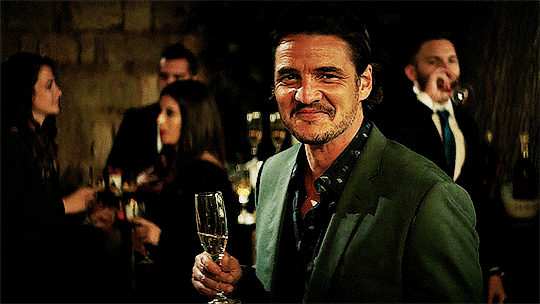
Javi Gutierrez’s third favorite movie is Paddington 2, so it only seems appropriate to name a fanfic about him Paddington 3, while giving him an adorable, teddy bear looking dog named Paddington.
youtube
Javi and X’s nicknames: • Mi vida, mi amor - my life, my love • Cara mia, Querida, and Mon cherº • This is Italian, Spanish, and French, respectively * Cara mia - my darling (feminine) * Querida - my dear (feminine) * Mon cher - my dear (masculine) º This is an homage to the Addams Family movies starring Raúl Juliá and Anjelica Huston, playing Gomez and Morticia Addams, who are passionately in love. Morticia’s use of French drives Gomez wild.
youtube
Javi washing his hands - Because nobody needs a UTI or any other infection, be real people - Javi’s so considerate!
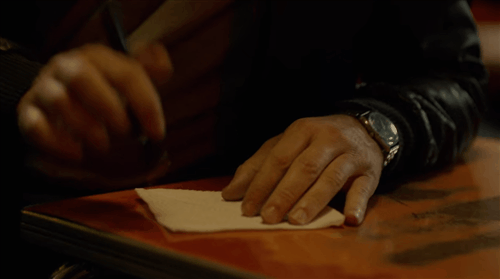
The line “Reader, I was successful” in regards to sneaking more ice cream onto Javi’s chest is a little homage to Charlotte Brontë’s Jane Eyre, towards the end when Jane narrates, “Reader, I married him,” speaking of course, about Mr. Rochester. (This might come back in future fanfics I write, pay attention, Reader 🙂) “No. Más. Manos.” Have you ever heard of the film, Manos, Hands of Fate? Well good news, the whole MST3K version of the movie is available to stream for free on YouTube:
youtube
"Slowly, he looked me up and down, “As you wish, cara mia,” - this one's personal, and one of my first childhood crushes ever, Cary Elwes as Westley aka Dread Pirate Roberts, in The Princess Bride. Oh, how my tiny little heart frantically pumped, understanding that when he said, "As you wish," he really meant, "I love you."
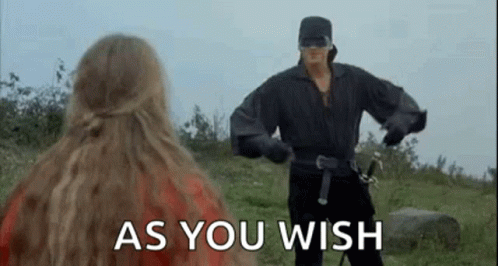
"Giant Inflatable Arm Waving Guys outside of car dealerships" - well, for me it’s always about Always Sunny.
youtube
"...nuzzling right in the sweet spot where it tickles a little, but also makes you forget where you are - so what, who cares?" - I can't say "So what? Who cares?" without always thinking about Fred Armisen dressed as Joy Behar. And now, neither will you.
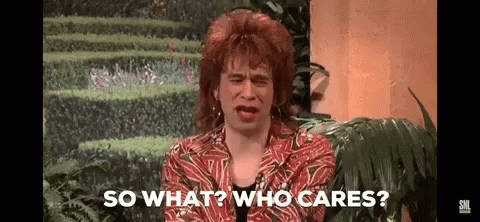
“You can’t leave Baby on the counter,” is a throwback to this iconic scene, and I’m including it because not everyone is #Blessed to know what a gift Patrick Swazye was. I also included the water dance as an homage to the final dance scene in Dirty Dancing, but with a Spanish flair, just for Javi.
youtube
"With his right arm looking like Michelangelo carved it out of marble" - Hi, David much?


“Like la petite mort? Komm süsser tod?” La petite mort - French for “the little death” is analogous to experiencing an orgasm, dying a little, seeing the light Komm süsser tod - this is the German version, “come sweet death,” and is in reference to the piece by J.S. Bach, Komm süßer Tod, komm selge Ruh, (Come, sweet death, come, blessed rest): https://www.classicfm.com/composers/bach/music/come-sweet-death/ ; Five times the woman at prayer in the song begs for death, and the sweet release of paradise - and you wonder how it became synonymous with reaching climax? https://www.bachvereniging.nl/en/bwv/bwv-478

Oh, Naughty Little Mermaid!

"I read that it’s supposed to be a shield in front of him, and that he’s holding a club raised behind him. It’s certainly more gladiatorial" - Y'all ready for Pedro in Gladiator 2?

“...I’d definitely be inclined to be a stealthy archer!” - this is actually a reference to Skyrim, the Bethesda game. IYKYK - and definitely not to be confused with this one:
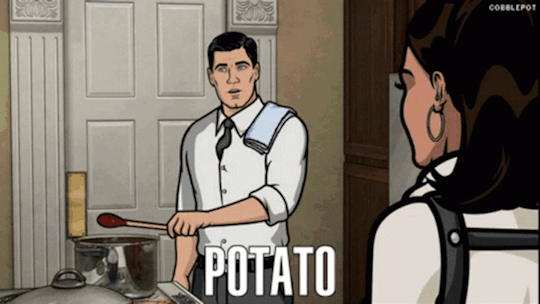
"Every Day You Play! Yes! Yes! I remembered!" - This is not the full poem, just the last few stanzas. Below I'm including the entire poem, English vs. the original Spanish. Every Day You Play by Pablo Neruda English vs. Spanish The translation I included was not specifically this one. It was my attempt through translating on my own - in addition to comparing multiple translations in order to get what I felt was an accurate English version that also captured the romance and musicality of Neruda's words. This analysis does an excellent job of describing the various emotions Neruda feels as he describes this relationship that he holds so dear, with such passion, and intensity - try not swoon, I dare you:
“As you wish,” and he jerked me upright….” This is absolutely inspired by two things, first the more obvious one, Princess Bride - see earlier gif.
And secondly, a specific scene in Narcos, because I needed it to be, and so did you. Don’t lie. Consider this - Javi G. roleplaying Javi P., is that technically an Inception? Should we ask Leo? Nah. He's busy. SUPER, SUPER NSFW Peña scene link to jog your memory just over yonder: Javi and I will both gleefully giggle while watching this, but at some point I will need to fan myself so that I don't get the vapors.

Dr. Frankenstein - of course I’m referring to Gene Wilder.
youtube
“Let’s stick a pin in it, ‘kay?” - I know you remember this SNL Skit:

"Two old guy muppets" - in case you’re not familiar:
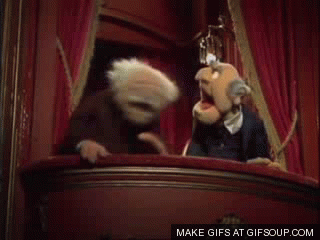
“Mi hermosa paloma” - my beautiful dove. La Paloma was Frida Kahlo’s nickname, while her husband Diego Rivera was nicknamed El Elefante, a complex, yet beautiful real life relationship worth learning about:
youtube
Our Flag Means Death - if you haven’t watched it yet, I’m curious why not.
youtube
"There’s an artist by the name of Joan Miró who painted a series of works called ‘The Constellations’ during WWII" - So you'd like to learn more about Joan Miró?
There were many artists, like Miró living in Paris around the time Germany began its infiltration, and while Miró managed to narrowly flee to Spain many, like Marc Chagall, Max Ernst, André and Jacqueline (neé Lamba) Breton, and Consuelo de Saint-Exupéry (Antoine de Saint-Exupéry's wife - he was busy flying a Bloch MB with the Armée de l'Air for a bit), to name a few, took up residence at Villa Air-Bel, just outside Marseille as part of a refugee project conceived by the ERC (Emergency Rescue Committee, an American humanitarian effort based in Marseille). Varian Fry, an American journalist, along with Mary Jayne Gold, an American heiress from Chicago, and Albert Hirschman, a Jewish-German humanitarian from Berlin, worked together prior to U.S. involvement in WWII to provide support and resettlement opportunites for refugees. They saved over 2,000 people, including 200 artists and intellectuals at risk of the advancing forces.
The International Rescue Committee did not stop its work after WWII, they continued, and in the 1960's when Varian Fry needed to raise additional funds for the IRC, Jacques Lipchitz, one of the artists Fry rescued suggested "Flight" as the theme - the concept encapsulating the refugee experience. Over 300 artists contributed one of a kind works, including Miró.
It's a little disappointing that Kathy Burke in the Travel Man video I included at the end, is so disinterested in Miró's work; but it's also hilarious that Richard Ayoade called Picasso a hack, because Joan Miró himself considered Picasso bougie and is quoted as saying, "I will break their guitar," referring of course, to Picasso's cubist paintings and sculptures of a guitar. Man loves his guitars, okay?





(There's more guitar shtuff, but I'm sure if you're motivated, you'll find your way to them.) Gary Busey - one of the most frightening actors you could possibly encounter in the wild, and that’s a fact. If you don't want to sign up to read the whole article, the first few paragraphs should provide an adequate characterization:
“Sherlock-inspired Mind Palace” from the BBC show Sherlock, starring Benedict Cumberbatch.

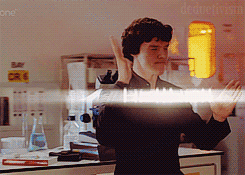
“I think I know who was on the grassy knoll!” - while I’m not making light of the original horrendous incident, the truth is you could have your pick of television series, movies, and books that make the conspiracy or the event a plot device, and that in and of itself is the reference: The Umbrella Academy, 11/22/63 by Stephen King, Mad Men, Quantum Leap, the list goes on.

As a long time bartender, I love mixing up drinks and have a strong interest in cocktail history. I'm a purist who believes that the best cocktails use the best ingredients; poor ingredients often are high in sugar, and that's what leaves you with a hangover the next day. One of my favorite resources is Imbibe Magazine, and so I present, Imbibe Magazine's collection of Old Fashioned Riffs. Cheers, loves.
Imbibe Magazine Old Fashioned Riffs
“all up ons” - this is an extremely old internet reference to a character named Strong Bad, who used the phrase in interesting and sometimes confusing ways:
youtube
“Oh! Hel-lo, Sailor!” - super obscure reference to this Anne Taintor piece:
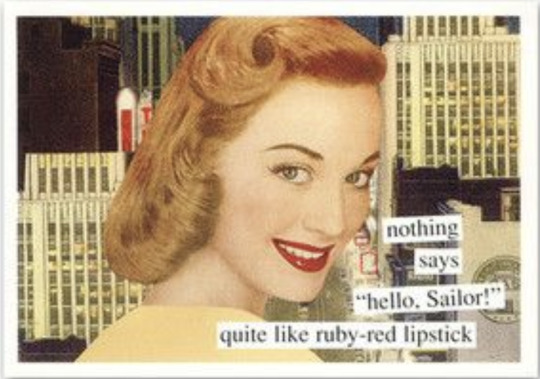
There's more Easter Eggs to come, don't you worry, in Easter Eggs Part 2: More Easter Eggs, The Eggening.
You can find that RIGHT HERE.
1 note
·
View note
Text
The Future In A Can
We live in exciting times. Well, that is, as long as you are OK with not just rapid change, but also the increasing role of AI in our lives. I was just discussing this with my Dean yesterday, and wound up being a few minutes late for class.
But it was meaningful conversation among peers about what is amounting to a revolution. You can run, but you can’t hide. AI is here, and as we concluded, everyone has to figure out how to embrace it within their own spheres of life, work, and influence. To do otherwise is to self-select membership in the Luddite community.
As my MBA students know, I am testing the waters with AI this semester to see what kind of supplemental content it can provide. In addition to my lengthy lectures (in text and audio format), I provide eight to 10 external links to articles, blogs, and academic research. But then I have the “AI Lecture,” which is the result of having keyed in a fairly specific query laden with keywords and other directives.
Let’s just say that I am impressed, but also fully aware that ChatGPT is not quite ready for prime time. Yet. I am learning as I do it too, and the better I get at framing the query, the better it gets at providing results. And no, I am not worried that AI will replace me or any of my colleagues. While today’s outputs are what I would label “Cliffs Notes” or “Marketing Lite,” I suspect it will one day be much closer to what a human professor can do, but it will never be able to discern nuance like humans can, nor provide insights into the most current of happenings for which there is very little written.

Like—and marvel ye at this amazing segue—the latest launch in the Coca-Cola Creations line dubbed Y3000. Available in both sugar and zero sugar versions, its formula is the first flavor co-created with human and artificial intelligence.
Fans of 80s- and 90s-era television will see the reference to MST3K. In fact, I bet Coca-Cola used the “3000��� instead of the “K” in order not to provoke copyright allegations. It is a very futuristic beverage, and the entire ongoing line is aimed at recruiting younger consumers. Naturally, the assumption is that openness to innovation and change is highly correlated with youth. That’s an inverse relationship, but no less powerful.
It is also not the first consumer goods product to have had AI play a role. Beck’s Bier used AI to create both a new beer and the marketing campaign to go with it. And Mars used AI to help generate possibilities for plant-based ingredients that had not yet been considered.
That is the beauty of AI. As long as you want to mine the ore of established knowledge, AI is perfect. It can generate new content from all of the old, all that was known and posted to the web before. But if you need it to do something with evolving, very current knowledge, it falls short, because it doesn’t have the knowledge base to tap into.
As my conversation with the Dean continued, the idea of a PA—Personal Assistant—came up. AI could easily play a role here, and we all—and that includes even older folks like me—could see this in our lifetimes. I see the beginnings of this every day.
Like this last weekend when I received an email prompt from Amazon inquiring about the ink supply in my home printer. I had linked my printer to my Alexa devices, and Alexa—God love her—had noticed I was running dangerously low. Amazon wanted to know if I would like to order more, as well as just set it up for automatic ordering every time the supply gets down to 20%. Of course, I said yes to both questions. Never mind the fact that Amazon’s price is about 25% less than that of Walmart. Plus, I never have to think about this again. Ever.
Alexa already handles my shopping list, which I find amazingly handy. No more paper-and-pen at home or in the store. I just check them off on my phone as I toss items into my cart. But Alexa still has a way to go here, because she has yet to make suggestions to me, nor query me as to why it has been a while since I bought a certain item. I bet those days are coming, because we have already seen the power of Amazon’s suggestion engine on their website.
I applaud Coca-Cola for testing the waters here, taking bold steps into what is still an uncharted ocean of possibilities. Of course, the success of the latest product depends on how good it tastes. While it is technically a limited edition, if it does well, Coca-Cola will be watching and trying to figure out how it can do more with the flavor, as well as the process for developing it in the first place.
I’ll be watching for this one in stores. It’s the future in a can, and as much as I love me a heapin’ helping of nostalgia, I really am all about tomorrow. Embrace it, both tomorrow and the AI that will play increasing roles in our lives.
Besides, there’s not a whole lot going on over in Ludditeville. I hear they don’t even have streaming yet.
Dr “To The Future…And Beyond” Gerlich
Audio Blog
1 note
·
View note
Text

@jupiterofetheria okay this is going to be as good a place to do this vent as any. Brace yourself. This is years in the making, coming from someone to whom this series was formative and also spent a few years actually studying film and filmmaking.
DEEP BREATH... and let's keep this as calm, collected and as impartial as I can reasonably be.
The 2021 adaptation of this story might hands down be the worst film I have ever watched. And I'm counting a LOT of MST3K-type things I've gone out of the way to watch. I'm counting The Amazing Bulk here for Christ's sake. I suppose it's worse knowing how insanely powerful the source material is and then what we got was just kind of a damp squib. In terms of betrayal of source material, the only reason it's not up there with Shyamalan's Last Airbender is that this film dropped in 2021 so nobody went to see it. My own first warning it even existed was seeing the DVDs on a bargain stand at the supermarket I worked at, and that was very much an indication of the quality of the picture. As I go through this dissection, I am going to have to name some names - but I just want to make clear that this really isn't anyone's fault I can nail down. But then, by the same token, it's also everyone's fault. What I refer to as a failure of production. The issues are just so widespread and so glaring it has to go back to the top. Think The Phantom Menace - everyone blamed Jake Lloyd and Ahmed Best at the time, but the fact is we had Ewan McGregor, Liam Neeson, Natalie Portman and SLJ all involved in that film and nobody was quite able to deliver their lines right because the issues were with Lucas having total final say and the only person on set who could really argue with him was Christopher Lee. So clearly it's something greater than simple lack of acting chops.
Because there was TALENT involved in CW2021. The director was Doug "The Bourne Identity" "Edge of Tomorrow: Live Die Repeat" Liman. The lead actors were Tom "Spider-Man" Holland and Daisy "Rey Skywalker Solana" Ridley. They had Mads "Hannibal Lecter" Mikkelsen as the main villain, and somehow one of the Jonas brothers came closest to convincing me they were actually the character they were trying to play. I have seen these people in other projects. I know they are capable of better than this - so evidently, can't really be their fault, can it?
I have a spurious and unresearched feeling that Doug Liman is credited as the director here in the same way that Ron Howard gets credit for Solo. I'd wager he was brought on after the studio ran test audiences, crapped themselves, stopped trusting their artists and demanded a rewrite, someone left and Liman came in and basically did the entire final act and edited the rest of the film together as best as he could, hence why it feels less like a coherent story and more a series of vignettes of culture clash and being forced to look at Holland's bottom two times more than I ever really needed or wanted to. Which is a bit weird because in the credits I think I did see Patrick Ness' name on the writing team, and maybe that explains how so many little world-building details ended up making it in despite the story at large getting butchered.
Now. It's an adaptation so I won't lean too far into things like location choices or rules of the world or anything - I always imagined more of a Midwestern region becoming Appalachian by Haven, but I guess there's no reason it couldn't all just be random Québécois forest. It just seemed boring and unimaginative, and while it's one step up from my own guess of "100% filmed in British Columbia for the tax incentives", I still wouldn't be surprised if tax incentives helped decide the filming location.
Aesthetically, credit where it's due, the execution of the Noise was fine. I feel that there was more they could have done with it but balancing visual and audio levels so that it's ever-present but not in the way of actual storytelling was always going to be the challenge here. Other than that, the world just felt dreary. This is supposed to be a new Eden. There's hardship but there's hope. It should be in the gritty category with room to go both ways with it, but instead it just felt bleak - you know, the place where people who go in wanting to be gritty end up. Looking at you, Game of Thrones. Things like the wildlife, the general appearance, that bit where Holland takes on a beholder in a lake - it didn't feel like New World. Also, Spackle do not look like a Death Trooper had it off with a xenomorph. Just saying.
(and I wouldn't be living up to my background in astrophysics and as a space kid if I didn't ask, how the hell can the sun never go down and the forest not roast? Tidal locking is not good for the prospects of life on a planet surface even given a solid atmosphere, where the hell are we, is it Ryloth? Sorry, it's such a small point, it's a random throwaway line, but god it pissed me off.)
And finally we get to our characters. I checked the CW wiki - turns out there is a wiki - and it credits our leads as being "late teens". Already, given the story and the beats they're expected to hit, that's not a great idea because it's a fucking coming of age story. But even then if they hadn't got mid-twenty somethings to play them it might be alright. And you know what? If they got Tom Holland maybe pre-Civil War, he would have been perfect. Can't speak so much for the others because I don't have the information to make that call. But instead of a bright-but-maleducated kid doing his goddamn best, we got a mumbly grumbly adult who permanently looks like he's choking on a slightly too large gobstopper.
The whole "be a man" thing is a gross oversimplification of Todd's arc and completely misses the point. He says/thinks this in the sense of oh god I'm being watched got to hide my feelings, when the point of the books is the exact opposite - Todd excels and earns his redemption by embracing his feelings and not feeling the obligation to hide them or suppress them. The whole symbology of the knife is lost since it's given to him by Prentiss, not Ben, and then it just kind of disappears towards the end. His song is basically completely forgotten about, the birthday thing is not present at all. And Viola? Why was she sent forward again? Serious question, if the colony ship is already in orbit they can probably...you know...just kind of see? Or launch probes? You send them forward to get a six month head start on finding either the first wave or a suitable settlement location and get things started, that makes sense. Sending them forward when your own cameras can probably do that job for you? I just feel like her parents teammates died for nothing. And why was that changed, exactly? What a fucking bedrock for their relationship, both of them have just lost their parents and end up finding a soul who's going through the same thing. She finds comfort in his Noise because even though she doesn't know what the hell it is she's seeing everything she's feeling reflected right back at her. But no, her parents died ages ago I guess.
And let's talk apparent skills. One of the first things we see Holland do is throw his knife and nail a bug to feed to Manchee (who is here too, don't worry, he doesn't matter, he can't even communicate via Noise and you won't feel bad when he dies), and my first thought was "Ooh. Chekhov's gun. I wonder how this cool skill that actually does make some sense will come back later." It didn't. Then later - in one of the most confusing single shots of the whole movie - when Holland approaches Ridley to try and force her to talk (again, given that she does talk and then doesn't then does then doesn't again and she's clearly about 25, the muteness kind of doesn't work), she throws one of the worst "martial arts" poses I've ever seen. Martial potato print paintings, more like. And it's just confusing because I have seen Daisy Ridley in Star Wars. Rey is no Anakin for sure but she's a perfectly capable combatant which means Daisy Ridley knows how to look like a perfectly capable combatant so what the fuck was it she was doing? Logical induction: she was told to do that specifically by a director or some kind of coordinator. Then it just never comes up again. And also, when how and why did Viola learn to ride a motorbike in space?
There's so much more I could go into. So much more I would very much enjoy going into. But I feel I've yapped on long enough. So I guess I'll just sign off with my final thought, the one lesson we should learn from this movie, and then what I hope is that someone else can pick this story up and give it a worthy adaptation. Not one of these books can be adequately told in a single movie, and certainly not a 90 minute one. This series, this story, DESERVES a proper adaptation that stays broadly loyal to the books without being afraid to tighten up and improve on parts that can benefit, expanding the world, bringing in some of the extra lore from the short stories, and crucially, putting the emotional aspect of it all front and centre. Get some of the team off of His Dark Materials in, maybe, they brought in lore from La Belle Sauvage and expanded on things and did a generally great job of it. I know a strong adaptation is possible because I actually tried testing the waters on adapting it as a way of staying in screenwriting practice, I have a handful of script drafts and I don't like blowing my own trumpet but I think they're pretty okay. So if this random anonymous autie on the internet can outdo an honest to god production studio in terms of the writing? Frankly I think done right it could be on the caliber of Lord of the Rings in terms of "stories that really matter". And I hope in a few years maybe we get it.
Finally, some positivity: I present to you the three moments in this movie that actually made me think "okay, that was good".
Cillian spends a few tense minutes warding the Mayor's posse away, telling them Todd's busy with chores and won't know anything and there's no way the newcomer could possibly be in their barn, and then as soon as it's safe: "She's in the barn, isn't she?"
[Background: in this adaptation Noise can be used to project an actual physical image into real space, it's not necessarily all in your head] Todd and Vi taking cover under a ledge during a rainstorm, very apropos of nothing they start making out. Then Todd's Noise-image of Viola dissolves away and the actual Viola is behind, staring at him, probably specifically at his tongue or something, with that fantastic "what the hell are you doing?" face that Daisy Ridley has perfected. I watched this movie twice and this visual gag got me both times. Credit where it's due, I guess.
While the point of the wider scene, Viola taking the fall so that Todd doesn't have to, has been completely missed and nullified by the fact that Todd is now elsewhere fixing the single severed electrical connection that will resume power to this decrepit old ship's antennae and then they'll just work I guess, using the firelighter to kill Aaron was fucking badass.
And there's one more very bright side to this movie, and that is that I have a cracking mental CW music video for Umbrella by Rihanna. And no, it does not feature Tom Holland or Zendaya any more.
youtube
I spent about a week stitching this together from bits and pieces I could scavenge on the internet. And I suppose that’s all I have to say about it.
#chaos walking#patrick ness#vent#rambles#viola eade#todd hewitt#thaaaaat went on a lot longer than I intended but nonetheless this vent was several years in the making
10 notes
·
View notes
Text
Courtiers
By VilyaNenyaVilya
inspired by this wonderful thread
Summary: Tony’s tired of all the dates he brings back to the tower leaving with barely a word. After walking in on a group of some of the Avengers, he gets a big dose of answers about why and… he’ll spin it to his advantage.
Rating: Teen. Wordcount: 2k. Tags: references to sex, fluff?, humor, Tony’s been oblivious but he figures it out, hopeful ending
(We’re in some bizarre AU land pre-IW where Tony’s very single and somehow every Avenger, plus Avenger-Loki, are either living in Avengers Tower or hang out there a lot. To paraphrase MST3K, don’t worry about it and relax. This is for fun)
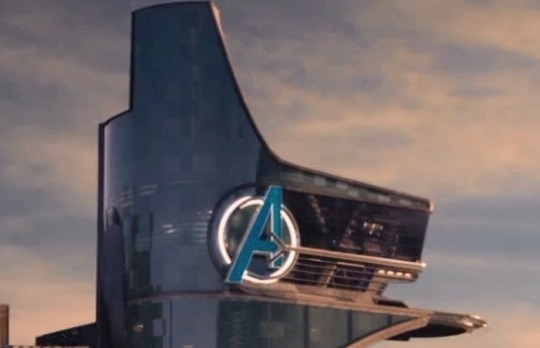
Tony stared at his phone. The night before, date number five million had made an empty excuse and left Avengers Tower. It was frustrating. He used to be able to flash a cocky smile and well… that was that. After the big breakup with Pepper, he would have thought having become Iron Man would have made it even easier to get back in the casual sex game.
On the contrary, there was no response to his last text, so much for Freddie. He liked them too. Whatever.
He stomped into the elevator, selected the floor where gear maintenance was, and pinched his nose. There had to be a reason he stopped being able to land even a one night stand. He was getting older, but he was still hot, thank you very much. Once the elevator opened, he went through the little lobby right to the door and found the usual set of troublemakers on the team that hung out there.
“It’s been months since I’ve gotten laid. Not for lack of trying with the wining and dining, the razzle dazzle. Then they get back here and leave? Does this place smell or something? You gotta tell me if it does. Two super soldiers, a kick ass spy, an alien wizard, and a human wizard. One of you would have to be able to tell. Thoughts?”
Steve was wiping down the Captain America shield. “No idea.”
Bucky was at the same table as Steve, but he had a sharpener and a row of perfectly lined up knives he was working on. “Beats me.”
Natasha was with them and had her two Bite bracelets in front of her. She kept her eyes on them. “Very odd.”
Loki, at another table, was leaning back in a chair and was polishing one of his magically appearing daggers. “A mystery.”
Stephen was sitting across from Loki and there was a pile of ancient looking books between them. He didn’t look at Tony and instead fiddled with that sling ring he always wore. “Perhaps we’ll never know.”
They were all being super weird. Tony narrowed his eyes and the tracts of his brain snapped together on that particular topic. He couldn’t believe he hadn’t noticed what the little cabal had been doing for months. Months. He thought he was unlucky, not that he was being secretly babysat.
“Wait hold on, where the hell do any of you get off on chasing my dates away? What gives you the right?”
No one looked at him for a long moment. Steve was the one that had the sense to look scolded. Served him right.
The dagger Loki had vanished in green magic and he crossed his arms. He was the first to say something. “Have you forgotten what happened with Marcus?”
“I did not forget the guy who left my bed and tried to break in the lab to steal tech for some HYDRA stragglers.”
“You were lucky he wasn’t an assassin.” Natasha finally looked at him.
“Can’t have any more of those in the Tower.” The timeline ran through Tony’s head… they all hadn’t started to interfere until after then.
Steve put down the shield. “Sophie had made some social media posts about getting herself a sugar daddy to bleed dry.”
Tony wasn’t opposed to being a sugar daddy exactly, but he would like some sentiment involved and not just ruthlessness.
Stephen crossed his arms too. “Joey was deep into drug dealing. To children, Tony. Children.”
So he had missed that. It was a big one to miss, not that he was going to admit that.
Bucky added, “Maria was stalking you.”
“These are situations I’m perfectly capable of handling. Remember when I took a nuke to space?” Tony pointed up. “Saved New York? Most of you were there or in the city.”
JARVIS’s voice came from the speakers in the ceiling. “They have your best interests at heart.”
Tony felt his eyes go wide. “You too, J?”
“I offered to assist.”
“I can spend one night with someone. I’m a big boy.”
“That’s not what you're truly after.”
“That’s enough out of you kiddo. You’re grounded.”
“I’m simply following my programming to watch over you.” There was a long pause. “Sir.”
Tony rubbed his face. So what if what he really wanted was someone to love him and he’d love them back. Someone who didn’t mind sometimes he was a mess or didn’t make the right decisions. Someone who recognized that every minute he was trying to correct those same mistakes and be a good man.
He looked around the gear maintenance room where everyone else had gone back to cleaning or whatever it was they were doing like some secret team-within-a-team. “Okay, fine, you all win. I’m picking up terrible matches for me. Any of you got any ideas who I should ask out?”
There was dead silence in the room.
Tony looked at each one of them, really looked. He could not be seeing what he was seeing. Nope. He kept that realization under wraps and really hoped his face didn’t give anything away. “What am I asking you bunch of singles for? Legolas has got to have some ideas.”
He turned on his heel and forced himself not to run out of the room. All of them? He was panicking but not in a panic attack, thank god. Just good old fashioned ‘my friend is into me’ times five.
He really was on his way to find Clint. The archer-spy was happily married and not poly, so he was the one person in the entire tower he was confident was not harboring feelings and that he could talk to. JARVIS was helpful and said he was in the kitchen. Tony walked quickly out of the elevator, through the little lobby area, and right to the kitchen door. Clint was at the white marble island making a sandwich.
“Oh thank god you’re here. Help. Help.”
Clint reached for the knife on his belt. “What’s the situation?”
“No bad guys, unless you count five of our teammates chasing my dates away and secretly being into me.”
He went back to making the sandwich. “Oh that.”
“You knew?” Tony knew his mouth was hanging open.
“Unspoken, but yeah, I picked up on the looks behind your back. Sometimes at your ass.” Clint cut the sandwich in two diagonally.
Tony needed solid answers and Clint was observant, he just didn’t wave it around. “Who exactly? To be absolutely clear here.”
“Nat, Strange, Rogers, Loki, and Barnes.”
“Not Rhodey, Bruce, Thor, Sam, Scott, Wanda, and Pietro.”
“Right.” Clint got a second plate from the cabinet and two glasses. He opened the fridge for a pitcher of something. Iced tea?
Tony let out a breath. His brain probably would have exploded if the list included the other half of the team. “I just figured it all out and ran away like a damn skittish horse. They probably noticed. I need something to drink.”
Clint poured the liquid into both glasses. “Iced tea is all I’m gonna serve you.”
What a time to be a recovering alcoholic. “Thanks, I know, I know. I won’t. But I… is this bad? This might be bad?”
“J? Get Bruce.”
“Already sent him up, Agent Barton.”
“Eat this.” Clint took half of the sandwich he made for himself and put it on the second plate. He slid it over with the iced tea.
Tony dutifully sat on a stool like he was one of Clint’s kids. “Is it bad? It’s weird? It’s definitely weird. Sort of messed up. Are they all just pretending to be my friends because they want to get in my pants?”
“I am confident that’s not what anyone is doing. Silently pining away for you because they think you won’t be interested is more likely.”
“They’ve been interfering.” Tony’s voice came out a little bitter. So he was a little angry because it was overstepping in a big way. Anything they found out about his dates they could have just told him.
“That’s a hard one, but Freddie is married with five kids.” Clint sipped his iced tea.
“You too? Don’t tell me Laura and you want a third after all. That might break me.”
Clint shook his head. “Just looking into it from a security standpoint as your friend. Promise.”
“Freddie is married.” Tony frowned. That stung.
“Yeah. I was going to tell you next time I saw you.”
“I really liked them. They said they were in the city on a consulting gig for a few months.”
“That part is true. Back home they have a family and are not separated. Sorry man.”
Tony thought he could have more than a few nights with the beautiful and handsome marketing mogul and then maybe it could turn into something more. Damn. “Why can’t I just pick someone good for me. This has gotten to be ridiculous.”
There was movement at the doorway and Bruce walked in. “What’s up?”
Tony gave Bruce the rundown of the situation. As he explained, Bruce’s eyes got wider and wider. Some tracts of Tony’s brain started thinking of ways to resolve everything… Nat, Loki, Steve, Bucky, and Stephen were his friends and… complicated wasn’t the word.
Bruce said, “What? That doesn’t make sense.”
“Exactly! Are we in some alternate universe where Avengers Tower is a reality tv show? There are cameras everywhere, but they’re my cameras. Unless they’ve been hacked and this is the Truman Show.” Tony looked suspiciously at where he knew security cameras for JARVIS to be.
“They’re really interested in you?” Bruce sat down on a stool next to him.
“Who can blame them, look at me, I’m a catch, even with the periods of being a hot mess.” The tracts of his brain now had started thinking they all would be able to understand him… and they all had qualities that if he looked at them in a different way were… intriguing. Of course all of them being hot as hell didn’t hurt. He’d have to choose though…
Clint nodded. “I’d say they are.”
“So I didn’t imagine Loki checking you out lately.”
“You kept that to yourself? Come on, you’re supposed to be my science bro.” Tony poked Bruce in the arm. He could have been having hot and steamy sexy times, or maybe cold -Loki was a certain kind of alien- for what, months? And Clint was just as bad not saying anything. Tony could have been having a lot of great sex with great people that could lead to more.
Bruce shrugged. “I thought I needed my eyes checked. He’s Loki.”
“Maybe I’m irresistible.” Tony perked up at that. Sure, the situation was a shock, but hell, he still had it. He was Tony Stark, Iron Man. People wanted him. Avengers wanted him. Hell yeah.
Clint had sat down too and was eating his half of the sandwich. “This is really going to your head.”
“Once I got over the shock of five of my friends chasing away my dates, I started thinking of the possibilities.” So many possibilities. He took a bite of the sandwich and chewed.
“What are those?”
He took a moment and swallowed the food. One tract of his brain had an absolutely brilliant idea. Maybe his best one since Iron Man. “It’s The Bachelor.”
“We’re still on the reality tv topic.” Bruce rubbed his face.
Tony moved his hand in the air for dramatic effect. “I can see it now. The Bachelor: Tony Stark Edition. Wednesdays at 8pm Eastern/7pm Central on ABC.”
“You’re going on the Bachelor.” It was Clint’s turn to go wide-eyed.
“Correction, all of the Avengers are going on The Bachelor. Both of you have to be with me. I’m roping in the rest of the team to make a panel of guest judges. Help me out? I haven’t been doing great in the dating game lately. Ever, really.”
Clint nodded. “I’m in.”
“You don’t get to automatically vote for Nat.” Tony wiggled his finger.
“Fine.”
Bruce patted his shoulder. “Now that you bring it up, I have a lot of thoughts.”
“Fantastic.” Tony was enthusiastic.
He was going to make the most out of the situation. Step 1: Call ABC or maybe just Chris Harrison directly. Step 2: Convince everyone else to go on the show. Step 3: Find the romantic love of his life. Easy.
FIN
Who does Tony end up with? Pick your own fighter(s).
Ending inspired by @stxrksarc ‘s The Bachelor Tony Stark Edition. not butting in but it just fit for a resolution ya know?
#mcu fanfiction#tony stark fanfic#tony stark fanfiction#tony stark#tony stark mcu#frostiron#stony#winteriron#ironstrange#ironwidow#clint barton#bruce banner#Loki#steve rogers#bucky barnes#natasha romanoff#Reality TV Shenanigans#all around shenanigans#my fanfiction
71 notes
·
View notes
Text
Space Ghost Week

Space Ghost Coast to Coast #30: “Late Show” | October 23, 1996 | S03E12
Written by a couple of LEGENDARY Letterman writers (not naming them because I don't wanna have to figure out how to spell the one guy's last name! Please! I beg of you! Do not make me look it up and copy and paste it here!), Space Ghost does a full-on episode of Late Show in “Late Show”, spoofing all the now-forgotten antics of the David Letterman program. Fun fact: this is one of the first episodes I ever properly saw! I had the MASK VHS, with it's requisite Space Ghost short. I watched that a bunch. I also watched Talk Soup on E!, which would regularly feature Space Ghost clips. It whet my whistle, but my whistle longed for full episodes.
We didn't get the Cartoon Network as part of our cable package, which was endlessly disappointing to me. When I finally got to see an episode (this one) I was so happy and I loved it so much. I told my dad that he should watch this show on the road; he traveled for his job half the week. My dad literally had dual residency in two different cities just so he could have a family AND a cool apartment all to himself! The absolute dream. Spread your DNA around like you're the king of Prussia AND have a bachelor pad where you may or may not have slammed non-my-mom puss (I don't actually know what my dad did on the road, FYI and we ain't talking much these days and he'll probably die before I ever know! Merry Christmas!).
I'm not sure how I saw this when I did; I remember at a point I had my cousin tape it for me, but when I explained that I wanted him to tape it every single week he was like “what? WHY?” because his family were a bunch of weirdo farmers and more interested in playing with crawdads and stuff than COLLECTING TV RECORDINGS. Absolute FREAKS.
I'm sad to say that it took a little more time before I ever saw the original Sonny Sharrock opening of Space Ghost; the NEW computer-animated opening created for this episode wound up becoming the new opening for a little while. OH! Speaking of that: The DVDs have a bunch of unused opening concepts that were created by Joel Hodgeson (I think with his brother Buford Hodgeson). They are kinda cool but a little too MST3K-like. I think they were maybe meant for the next season, because one of them has Birdman in it. They are on there as Easter Eggs.
Okay, onto the actual episode: It's funny! But I do think it drags a bit and would've been better off as a shorter episode. Not that I'm actually complaining about having more Space Ghost-- you gotta admit, “that's nice”. This one features John Popper of Blues Traveller, here assisting Zorak's band. He's hammy (in more ways than one! LOL!), and he growls at Space Ghost at one point. Yikes! Speaking of big fat pigs, President Clinton (real) is in this episode, and he gets called “A boat show visitor” (shout out to all the boat show visitors in my feed).
Janeane Garofalo is in this and she is at her peak fuckability. I saw her a few years ago and I still would. So far my top three Space Ghost babes of season three are: 1) Janeane 2) Juliana Hatfield 3) girl on bus. Janeane if you read this for some reason I'm sorry for being sexist about you, but you get what you pay for, baby!
Flip Orley morphs into Dave Grohl, one of the coolest guys around. I remember repeating his line about “Foo Fighters” in this episode to kids at school, thinking it made me sound smart and cool, which is that they are the Foo Fighters,they fight for (as in behalf of) Foo, not against Foo. I would regurgitate this line every time they came up. People hated me
MAIL BAG
In reference to me calling Jimmy Pardo’s podcast “occasionally funny”
Occasionally funny is charitable for Jimmy Pardo these days. Guy has been off his nutter since he told his jackass Chicago buddies to take a hike.
Honestly yeah, the podcast fell off for me when he simultaneously decided to give his dullard wack pack more mic time AND chase clout by having Conan guests be on his show all the time. I guess when he and his friends ran out of 90s stand-up comedy stories I lost interest. I still think Pardo is really funny! He hasn’t gotten worse, I just think the formula for the show is off.
3 notes
·
View notes
Text
BECAUSE I’M NOT POPULAR, I’LL READ WATAMOTE: CHAPTER #167
Hey, I’m not dead!
Yeah, sorry that took a while. Had a lot of real-life shit to work through, honestly. In any case, I finally sat my butt down to really crack down on yet another fun-tastical chapter. Tomoko’s actually doing what a lot of quasi-incel degenerates are afraid to do in high school and is taking an actual stab at self-improvement. Will karma rear its ugly head, or is the series now beyond that point?
Chapter 167: Because I’m Not Popular, I’ll Spend My Time Wisely unlike me

This is a really pretty shot and...that’s about it. Real pretty.

Oh dear! The friendship disease has disrupted Tomoko’s gremlin-like body clock and has her waking up early like a healthy human being!

Reminds of that one Gintama episode. You know, that one with Kagura and the sick kid and you don’t care, do you?

I know Japan prides itself on its cheap, quality goods, but Tomoko is a real penny-pincher, eh? Well, she’s a Gen Zer, so I can’t complain.

Not sure if this makes me sound like a perv or whatever, but hot damn, the detail on this model is stupidly good. I mean, just look at the patterning on that bra. You can really tell when Ikko’s really getting into the art.
They’re really milking the armpit fetish, aren’t they?
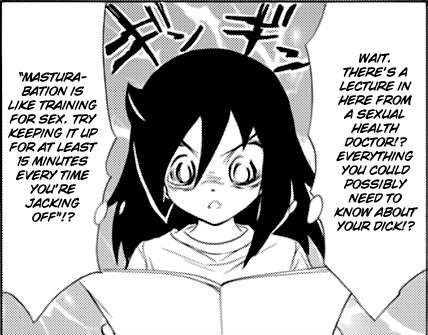
Tomoko...sweetie...my girl...
You don’t even have a dick. I mean, sure, you could find it fascinating from a purely educational, not-applicable-to-you perspective. And yeah, I suppose it could be useful if you were to start a sexual relationship with a noncanonical male. But to be honest, I can’t help but take it as more signs of your gender dysphoria here.
I mean, hey, whatever floats your boat.
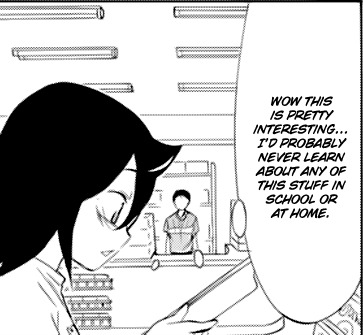
Well, they say kids learn more about practical knowledge out in the real world than in school, don’t they?
Then again, coughgoogleitcough.
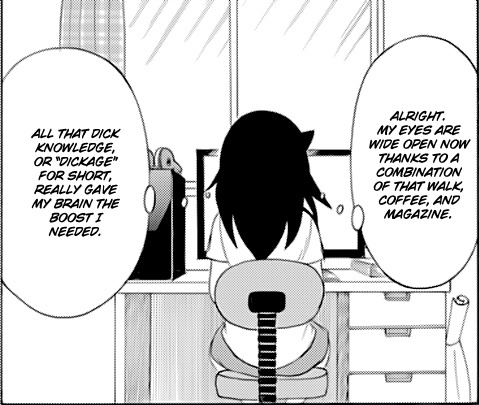
I always thought Tomoko was just having some kind of psychosomatic experience when she talks about being de-energized from a lack of sexual stimulation.
Now I’m inches from calling that shit an actual, physiological withdrawal.
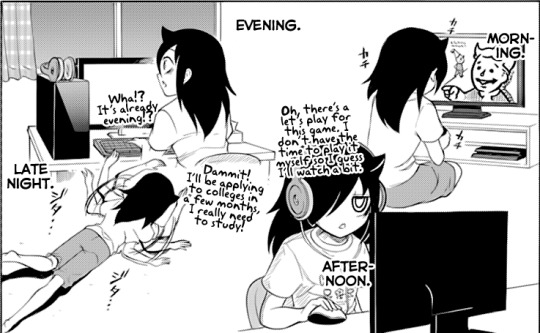
Ah, the good ol’ days. Back when future prospects felt like a lifetime away and you could spend days on end dicking around, lamenting the need to get serious, and disregarding your resolve right after because you secretly didn’t really care.
...I gotta stop projecting.
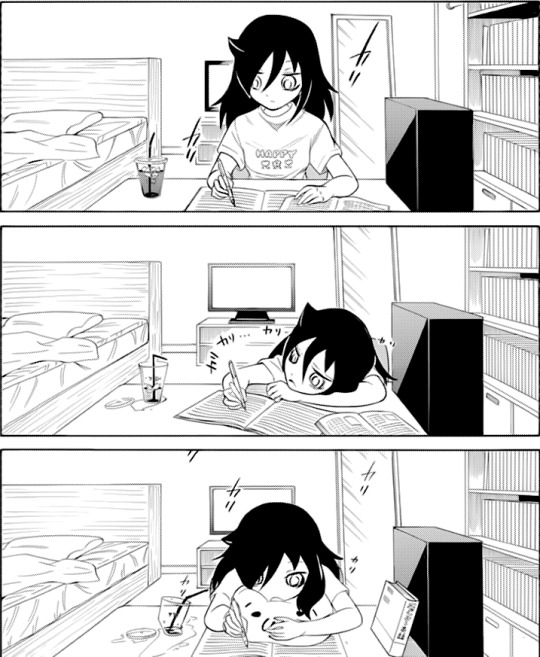
Despite Tomoko proving time and again that she can be a crass-hole with a negative outlook on life, it’s when she does childish things like laying your head on your arm when studying and cuddling her plushies that her innocent side pops up and you realize that Tomoko’s a legitimate cutie.

Fake-smoking? Tomoko, stop! If you keep this up, you’ll turn from a deconstruction of a cute, moe girl to becoming an actual cute, moe girl.

I only just noticed that Tomoko’s wearing a “happy” shirt. Remember when she was sporting the “alone” shirt back in year one? Even her clothes get character development.
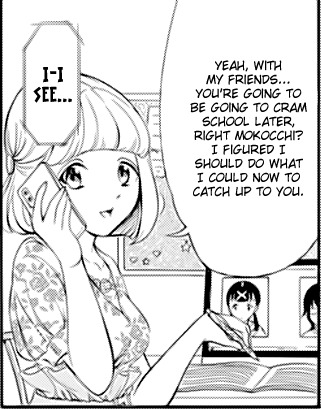
Oh, shit. Your girl Yuu-chan talking this whole cram school thing seriously even though she’s at a disadvantage. You see, this is why Yuu is literally the best. Despite being at the “top” of the school clique food chain, she has not once ever felt like “bottomfeeders” like Tomoko and Komi were below her in any way. Sure, she knows they’re weirdos, but she makes those acknowledgments without judgement, and all while putting herself on the same leveling field. She doesn’t love them ironically–she loves them sincerely, and that’s why Yuu is awesome.
Sorry if this turned into a ramble, but Yuu only gets like, one panel of dialogue nowadays and I wanted to make the most of it.

Tomoko be raising that “phone-call” flag like a motherfucking chad.

...
...
...
Oh, sorry. I saw Yuri with her hair down and lost track of time.
...
...
...
Damn, Yuri’s pretty.

Black leggings at home? That’s exactly the kind of conservative attire Yuri would wear and only Yuri could look amazing in. Seriously, If Ikko hadn’t become a manga artist, she would have made a damn fine fashion designer.
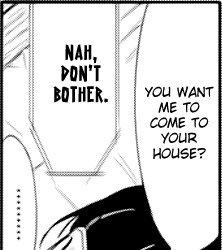
And Tomoko be crushing that “home-visit” flag like a motherfucking chode.
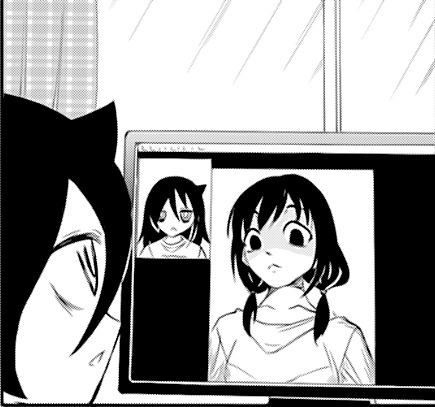
I could make a pretty tasteless joke about how “haha, Yuri will never look at you like you’re trash like she does at Tomoko,” but,
a. it’s just the angle of the smartphone like Yuri said, and
b. you’d probably prefer to get denied like that, wouldn’t you?

I can’t help but wonder if Tomoko realizes just how homoerotic she sounds. Like, does she have any inclination that her borderline-sexual harassment jokes could easily be misconstrued as flirting? Sure, she might be using the old excuse that “we’re both girls, so it’s fine right?”, but given that Tomoko at least knows about LGBTQ+, you’d think it would have at least crossed her mind.
Or maybe, on a sadder note, Tomoko doesn’t see it as flirting because she really does have zero faith in her own attractiveness...
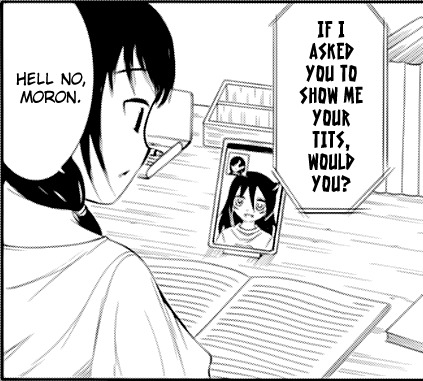
There is no heterosexual reason for this exchange whatsoever.

Alright, so I’m a dude, so...hell do I know. But do girls typically not wear bras when just lounging around the house? I know Tomoko is the kind to just wear tank tops if she can help it, but I always thought that was a characterization unique to her, and that other girls wear bras for the comfort and support like any other undergarment. I mean, sure, Yuri’s kind of reserved, but I wouldn’t think wearing a bra at home would be considered an oddity, yeah? I ask this out of genuine curiosity, but I’ll stop before it gets too creepy.
Side note, you can officially tell when Yuri gets pissed by her nose crinkles.

I could give a long, analytical spiel about why Yuri didn’t give Tomoko a straight answer and speculate on what she was doing, but I eventually realized the answer was actually really simple:
It didn’t fucking matter to the story.

The last time Tomoko had one of these “I know!” moments, she ended up trimming her pubes on a class trip. But surely Tomoko’s character growth wouldn’t allow something like that to happen again, would it not? ( ͡° ͜ʖ ͡°)

Adorbs.
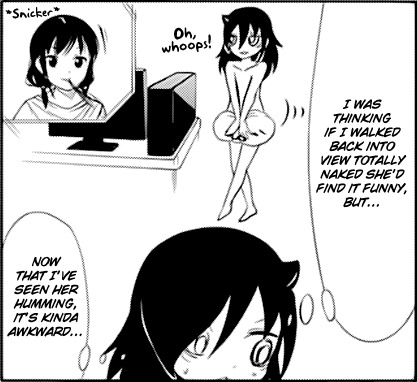
Can’t fight awkward with awkward, can you?
Tomoko, what are you playing at? You just said that video chatting was erotic and tried to get Yuri to lewd herself for you. And now you were planning to appear on-screen totally naked and you somehow don’t see any sexual implications for this at all? Finding it funny would be an elementary schooler’s mentality. If you seriously have no confidence in your sexuality, then sweetheart, you need some help.

You ever notice that Tomoko can lie through her teeth when trying to screw with people, but when lying to be nice, it sounds so phony? I think that says a lot about the kind of person she is.

Ya’ll knew I was gonna add this panel, didn’t you?
I was never one to go crazy about blushing anime girls ‘cause to me, it always felt like it stemmed from some sadistic desire to see girls look uncomfortable. So while I can’t get behind it for reasons like that, I can admit that Yuri’s blush is fucking precious and I think that’s because I love seeing her so emotionally transparent for once. It feels rare, raw and well-earned after all this time, so yeah. A++
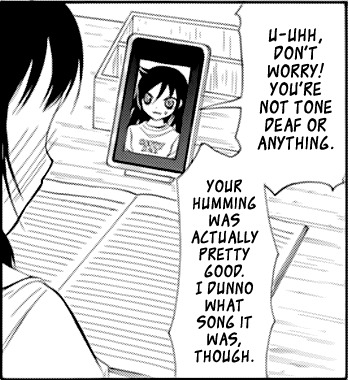
Oh, Tomoko, if only you knew that skill often has nothing to do with it. Yuri’s not embarrassed because she sucks at humming, but because you saw a side of her that she only lets out in private. Trying to reassure her is a good move, but putting the girl on blast like that is not going to end well.
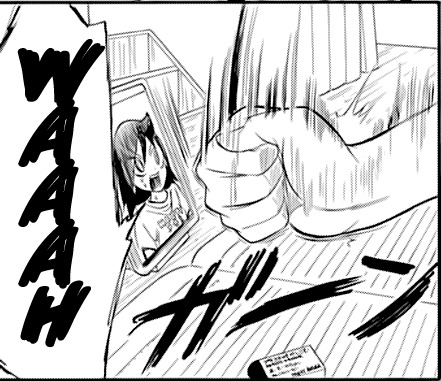
I felt like the vibration alone would’ve left a huge-ass crack on Yuri’s phone screen. This whole moment is like eleven tiers of funny because even though Tomoko is probably miles away, the impact of Yuri’s punch still jostles her. It also helps that we can visibly see Yuri’s fist come down mere millimeters from Tomoko’s mug.
There is no escaping her wrath, Tomoko.

I feel you, girl. For me, nothing beats a good ol’ burger and fries after a hard day of studying.

Careful there, Tomoko. If there’s one thing that studying has taught me (other than I hate it), it’s that you could get serious burn out if you go all-out on the first day, especially if you’re typically not a regular studier. Always make sure to get dem breaks in.
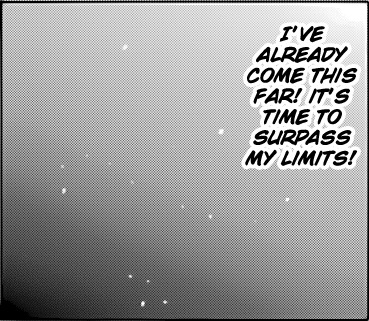
That sounds like the kind of line you’d see in a mainstream shounen action manga like [ ]. I don’t even have a direct reference here, so feel free to fill in the blank.

Hey, with Tomoko’s luck, I was expecting karma to hit her harder than Truck-kun in an isekai anime, so I consider this a small loss.

Man, remember when we were young and had ambitions as high as the sky, and we all wanted to change the world by being firefighters, astronauts, idols, and presidents?
Kind of sucks that “financial stability” has become our goal in life as we enter adulthood. Perhaps that’s just the mindset creative-types like Tomoko have towards the STEM industry when it’s hard to see what makes that world so personally fulfilling.
Oops, my opinions are starting to seep in, so let's move on.
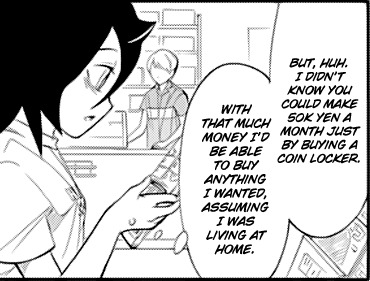
Nooo, don’t do it, Nico Tanigawa Tomoko! Don’t sell out your passions for financial security even though it’s a totally viable career decision! How else are we going to validate the pursuit of our artistic dreams?

How in the hell is Tomoko balancing that drink? I’m willing to let it pass for rule of cute, but I don’t care how secure that cup is. One wrong move and those practice sheets are done for.

Jesus Christ, Nemo is on some otherworldly dimension of cute right here.

I don’t even think Tomoko is trying to one-up her or anything. This is already the most effort she’s given to study in a single instance, so I think she genuinely just wants to share this personal accomplishment.

You know, while it’s already been established that Tomoko and Nemo have different tastes in anime, that doesn’t necessarily mean they wouldn’t watch the same show, right? Just for different reasons. While Nemo would watch her cute slice-of-life series earnestly, Tomoko would probably watch them ironically MST3K-style. In any case, it’s a good way for them to find some common ground.
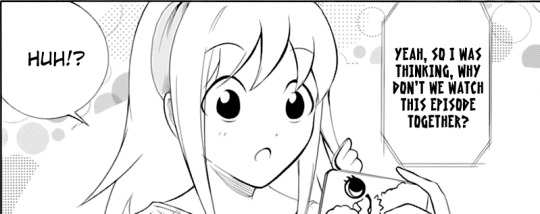
Bruh, Nemo must be over the fucking moon for this opportunity. Think about it: when was the last time she’s had someone to watch anime with her? After concealing her power level for so long, this could be the first time Nemo has had a fellow anime fan to geek out over a series with. And not just discussing it afterward, but actually reacting to a live episode together.
Nemo may give Tomoko all kinds of shit, but this is actually what she wanted all along, wasn’t it?
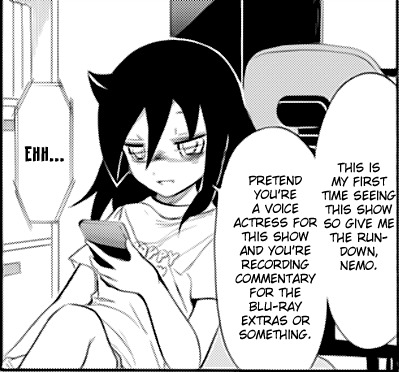
Boy, Tomoko sure gets pretty demanding when she’s sleep-deprived, huh? I’d hate to see how loose her inhibitions get when she’s stark-raving drunk.
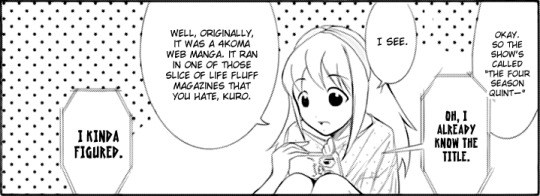
Is this referencing the Quintessential Quintuplets anime? I don’t know anything about it other than that’s a kickass title.
Hey now, Tomoko, beggars can’t be choosers. Let Nemo give you the play-by-play at her own pace. She’s even acknowledging that you hate the source magazine without a hint of judgment. She’s gonna go places.
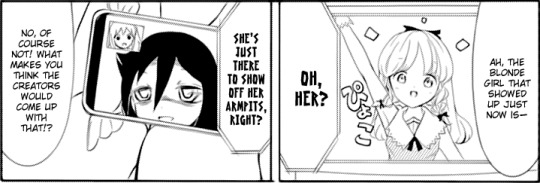
At first, I thought all this recent armpit content was just an incidental joke. Then I thought it was the mangaka slyly inserting their fetish into the series. Then I realized the series turned the joke on its head and made it a meta-reference about their very thing their readers were accusing them of.
Well played.
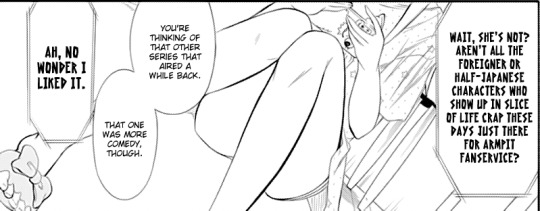
You ain’t slick with that leg service, Nino Tanigawa. Just sayin’.
Seriously though, I love the dynamic going on in this conversation. Tomoko and Nemo are approaching the discussion from different outlooks, the former looking at it from a degenerate’s perspective and the latter looking at it more optimistically. But even so, they’re not trying to “get the upper hand” like they might've done before. They’re simply having a totally organic talk about what they do and don’t like about the series, while still recognizing each other’s personal preferences. For once, it’s completely devoid of passive aggressiveness and it really shows how earnest their friendship has become.
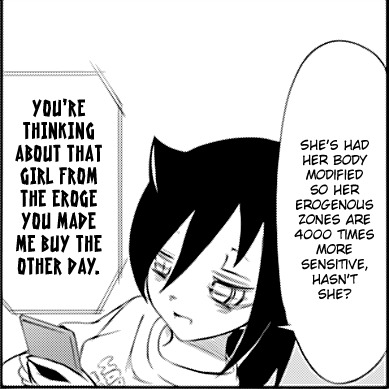
At some point, I think Tomoko’s consumed so much near-pornographic content that pretty much all anime, manga, VNs, etc. looks like the same hentai to her.
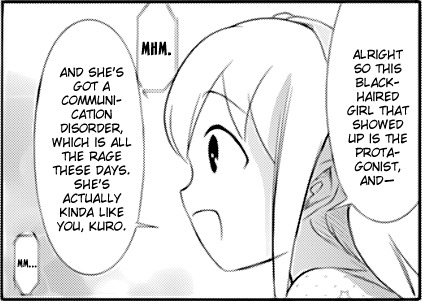
Every fiber of my being says that this is a reference to Komi-san Can’t Communicate, but it could just as well be the mangaka shooting themselves in the foot for a good joke. In any case, I do like how they point out shy, socially awkward girls is a rising trend that borders on romanticizing communication problems.
Does that make Watamote a hipster manga since it did the whole “social anxiety girl” shtick before it was cool?
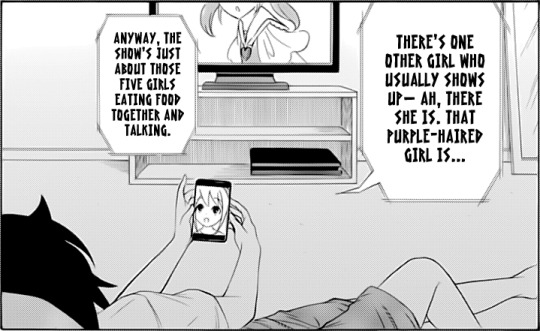
I wanted to make a pretentious joke about how basic that anime sounds and how I’m so above a show that panders to the masses, but even I like junk food, so I’ll spare you the hypocritical humor.

If Ucchi caught a glimpse of this, she’d probably explode right on the spot.
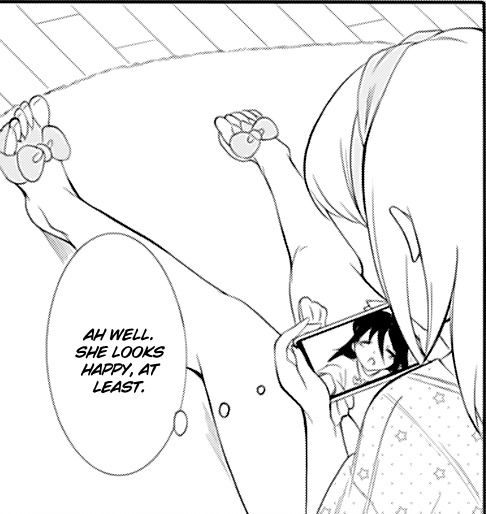
I spent a good five minutes trying to decipher how Tomoko’s sleeping expression could be seen as “happy”, and I realized that it’s not that she looks happy. It’s that she doesn’t look unhappy. I’d imagine that those plagued by anxiety and stress have it evident on their face when they sleep, so the fact that Tomoko fell asleep in relative bliss must mean she’s had a pretty satisfying day. To top it all off, this is one of the few times someone–and Nemo of all people–has seen Tomoko in all her vulnerability.
And you know what? Nothing bad happened. No punchline undermining the moment, no sarcastic quip, no embarrassment. Just genuine sweetness and it really speaks to the series’ faith in its heartwarming moments.
As a final note, I just wanted to thank everyone again for their patience. I’ve been trying to put a fresh spin on this, making it a little more comedic since its honestly getting harder to “analyze” without constantly repeating myself. It’s a lot of fun, and I hope you guys enjoy it for what it is.
#watamote#watamote review#chapter 167#no matter how i look at it it's you guys' fault i'm not popular!#tomoko kuroki#yuu naruse#yuri tamura#hina nemoto#review
53 notes
·
View notes
Text
I don’t know if many have already seen this (my guess is no), but here’s a collection of three storyboard scenes of The Lost Movie; two that weren’t included in the YT uploads and one known sequence but one where the text is clear (I seriously hate the MST3K approach on YT).
Some stray observations:
The working title, possibly the intended title, is “Feary Tale”.
Production lasted from about May to August 2015.
Jinafire def would’ve had a minion focus role in this movie. Her presence with the main girls during the campfire scene is unusual enough, and the storyboard’s lingering on her during the gift sequence when there’s no action to show only makes sense if her fate matters to the story. Plus, she’s a dragon, so the Evil Queen probably was like “Gimme! Gimme! Gimme!” (I wonder if minion-ized students would have been been a doll series.)
Toralei’s quest to have a decent singing voice continues.
The Evil Queen straight up drugs Bloodgood. I still can’t stop laughing.
Gah, I’m a sucker for journey montages set to music. I wonder if the music was finished. I’d love to hear what they had in mind that fits both franchises.
Draculaura’s photo failures are pretty funny too.
“The Evil Queen may have created this place, but the labyrinth also has a life of its own. Some of it is very beautiful.” - Like, this is a pretty important line for both Euna and the Labyrinth and you can’t hear shit of it in the YT uploads.
I hope we’ll one day get to see the script portion or storyboards detailing what happened between Clawd and Draculaura as well as between Deuce and Cleo. MH romance drama always was... yeah, but if you’re going to refer to it, I want to know what actually happened.
172 notes
·
View notes
Text
The Singles Jukebox Celebrates 30 Years of Rhythm Nation 1814 (a Janet Jackson retrospective)

Janet Jackson’s had one hell of a career. It’d be glittering even if you were to cut the album she released 30 years ago this week out of history. And historic is what Rhythm Nation 1814 is, not like a war, but like a discovery; it was groundbreaking and influential and so much pop released in its wake owes it a debt of gratitude. The album contained seven top 10 singles in the U.S., each with indelible melodies, state-of-the-art beats and vivid music videos. Janet was always on the radio, always on TV, and welcome everywhere she went. She endured the failure of two albums and the weight of family baggage before reinventing herself, seizing artistic control and having one of the longest and brightest imperial phases of any pop star. Sex positive, romantic, assertive and wise, she’s an icon whose brilliance comes as much from how her songs make us feel about ourselves as they do about her.
Her familial connections might help explain her, but they didn’t define or limit her. She’s a sympathetic performer, an innovator in the development of music video as an art form (someone in her camp needs to fix up her spotty presence on video streaming sites, people need to see these videos in HD) and a smart, underrated songwriter in her own right. There’s a lot of Jackson in Beyonce, in Rihanna, in Britney, and in any woman who makes us smile and makes us dance. Because she did all those things over and over again.
Here’s a bunch of songs by Miss Jackson that moved us, or just made us move:
Katherine St Asaph on “Nasty” [8.14]
Date the quote: “[His] dance cuts have a format-friendly, artificial sheen … but she seems more concerned with identity than playlists.” This is not from 2019, about a post-Spotify pop star (I cheated a bit, leaving out a reference to “Arthur Baker dance breaks”) but from the ’80s. Specifically, it’s from the Rolling Stone review of Janet Jackson’s’s Control, the first half of which is a review of a comparatively nothing Jermaine Jackson album. This was typical: if press didn’t dismiss her as an biographical afterthought who happened to still sing, they wrote about her alongside her family, and specifically her brother. (This continues to this day: Note the sustained attention given to her response to Leaving Neverland, which ultimately was to join her family in condemning it.) The line everyone quotes is “Ms. Jackson if you’re nasty,” but more pointed is one of the lines that precedes it: “my last name is Control.”
The lyric to “Nasty” is full of that sort of role-reversal, like a swordfight where one guy yoinks the other guy’s sword — the sword being the “nasty groove.” But said groove possibly illustrates the lyric even better. Made by producers/former The Time members/future creative partners Jam & Lewis out of big ’80s percussion, plus clanks and repurposed orchestral stabs from an Ensoniq Mirage, one of the earliest sampling keyboards, it doesn’t sound martial exactly, like some of Jackson’s later work, but certainly sounds stark. It sounds like a challenge, one Janet takes up: her past soubrette voice drops to a throatier register, then is stoked into roars. The beat’s not quite its own thing; “Nasty” resembles experiments like Herbie Hancock’s “Metal Beat,” and in turn much of New Jack Swing resembles it. But how Jam & Lewis described it was a rapper’s beat — now standard for pop or R&B singers, from Destiny’s Child to Ariana Grande and Billie Eilish, when they want a tougher image. Meanwhile, Britney took Janet’s soft spoken-word interlude “I could learn to like this” and extrapolated an entire career from it — and covered it, unusually early in her career — but simplified it, mostly collapsing the context of family ties and dignity and creative control onto one axis: sex. But what they’re all doing is asserting this kind of Control.
Part of appreciating songs from the ’80s and ’90s is prying them out of the clutches of the era’s pop-culture jokification– I do like MST3K, but their sort of snappy “Nasty” joke is kind of what I mean. More than one article/restaurant review/listicle attempts to identify, meme-ily, Janet’s idea of “nasty food” (Janet’s answer, dubiously, was whole squid). A certain comment by a certain head of state gave the song a late-breaking sales boost But put on some ’80s radio (or a contemporary playlist of people copying ’80s radio) and wait for “Nasty” to come on. The rest of the radio will flinch.
Kat Stevens on “What Have You Done For Me Lately?” [8.67]
“What Have You Done For Me Lately?” is a sparse, angry snap of a song, the overspill of weeks and months of gradually-building resentment. It’s taken a nudge from bezzie mate Paula Abdul for Janet to fully admit her relationship has gone sour: her once fun-loving, adoring beau has become complacent, content to put his feet up on the sofa and take Janet for granted. Should she leave? She loves him! Or does she? Should love really feel like a heavy weight, pressing down on you? Like your stomach won’t stop churning? Like letting the phone ring out unanswered rather than deal with his temper? Like maybe it’s your fault that he’s like this? “Who’s right? Who’s wrong?” Janet is determined to make a decision with a clear head, but the anxiety and hormones are bubbling underneath (“I never ask for more than I deserve…“). Thankfully Jam & Lewis are on hand with a clinical, whipcrack beat — snap out of it, Janet! The tension manifests itself in her zigzagging shoulders, hunched and strained and contorted, primed to lash out – just as he walks through the door! Janet is wary, but her dude is on his best behaviour, puppy-dog eyes, I’ll do better from now on, I swear. They dance perfectly in time together, remembering the good times: all is forgiven. Surely Janet hasn’t fallen for the same old lines, doomed to repeat the cycle? Paula is rolling her eyes: ugh, not this bullshit again… Then, as the happy couple laugh together over dinner, Janet glances back at us, and the smile falls from her face. The decision has been made. As soon as Mr ‘Not All Men’ leaves for work in the morning, she’s putting her passport in a safety deposit box and setting up a secret savings account to fund her getaway. The plan is in motion. You’ve got one life to life.
Thomas Inskeep on “Diamonds” (Herb Alpert ft. Janet Jackson) [6.80]
After “The Pleasure Principle,” this might actually be my favorite Janet Jackson single (even though she’s technically the featured artist on it). “Diamonds,” written and produced by Jimmy “Jam” Harris and Terry Lewis for Herb Alpert’s 1987 album Keep Your Eye on Me, is, in all but name, a Jam/Lewis/Janet record — with a few Alpert trumpet flourishes. The beats rock hard, and Janet delivers what may be (and certainly was at the time) her most IDGAF vocal: you’re gonna get Miss Jackson (because you’re clearly nasty) some diamonds, aren’t you?
Alfred Soto on “The Pleasure Principle” [8.43]
For all the banter over the years about the cold and steel of Jimmy Jam and Terry Lewis’ beats for Control, the coldest and steeliest they had no hand in creating. Songwriter Monte Moir, like Jam and Lewis also a The Time alum, stumbled on the title first: “I had to figure out what it was I was trying to say, I just stumbled into the title and realized it fit.” Sung by Jackson in her airiest, most insouciant coo, “The Pleasure Principle” starts with bass synth and cowbell before settling down into a matter-of-fact tale of a night of sin. To visualize the concept, choreographer Barry Lather put together one of Jackson’s most iconic videos, a masterpiece of athleticism involving chairs. Too cold and steely for the audience, or perhaps the hype cycle for a sixth single had exhausted itself: “The Pleasure Principle” missed the top ten in the summer of 1987, stopping at #14. So ignore the single mix and revel in Shep Pettibone’s Long Vocal Remix.
Kat Stevens on “Let’s Wait Awhile” [6.60]
Can you have an erection-section classic that’s primarily about abstinence? “Let’s Wait Awhile” has all the features of a late-night Magic FM request slot regular: soft electric piano, finger clicks instead of drums, lyrics about promises and feelings and stars shining bright. But this message is about trust, not lust. It takes courage to admit that you’re not ready, and it requires faith in the other person that they’re not going to be a dick about it. I remember the advice columns in Just 17 repeating over and over that as Informed Young Women we shouldn’t be pressured into sex, which was all well and good until it actually came to the act of Doing It, whereupon the fug of hormones and internalised misogyny meant that all rationality went out of the window. It’s the sign of how strong and confident Janet is in her relationship, that she can be ‘real honest’ and discuss her concerns freely with her partner, without worrying that he’s going to a) dump her b) tell his mates that she’s frigid or c) ‘persuade’ her round to his point of view (*shudder*). If he’s not willing to wait, maybe he’s not such an ideal person to be doing this sort of stuff with in the first place? I can hear the dude whining to his mate now: “I took her out for dinner and all I got was a perfectly vocalised key change!” Just 17 would be proud of you, Janet.
Jessica Doyle on “Miss You Much” [7.83]
A little context: in March 1989 Natalie Cole released “Miss You Like Crazy,” a ballad built for Cole to sing wide about longing. In June Paula Abdul released the third single off Forever Your Girl, “Cold Hearted,” whose video made a point of its group choreography. And then in late August came “Miss You Much,” the first single from Rhythm Nation 1814. Did Janet Jackson have beef with her ex-choreographer? Was that the kind of thing people talked about, in the pre-poptimist, pre-TMZ era? Because in retrospect “Miss You Much” looks like a dismissal of “Cold Hearted,” cool and upright where the latter was David-Fincher-directed sleazy. (By contrast, the director of “Miss You Much,” Dominic Sena, had already treated Jackson with respect in the video for “The Pleasure Principle.”) But also “Miss You Much” plays as a broader statement, a refusal of expectations. There’s nothing sad or ballad-like about it. There’s that opening high of “sho-o-ot,” and then Jackson’s on a roll: it’s all about her, the deliciousness of her feeling; she can barely bother to describe the “you” being missed so much besides the blanditries of smiling face and warm embrace. The power in “I’ll tell your mama/I’ll tell your friends/I’ll tell anyone whose heart can comprehend” isn’t in the longing; it’s in how much she relishes being the one who gets to do the telling. By 1989 she was in control enough to not have to utter the word once. “Miss You Much” isn’t a deep song, didn’t set out to accomplish as much as the title track or later songs like “That’s the Way Love Goes” or “Together Again” would. But thirty years later it still looks and sounds like (what we now call) a power move.
Katie Gill on “Rhythm Nation” [8.57]
How does one try to condense the reach and influence of “Rhythm Nation” in a single blurb? Entire articles have been written about this song and video (because really, you can’t talk about the song without talking about the video). It’s influenced singers, dancers, directors, choreographers. It won a Grammy as well as two MTV Music Video Awards when those awards actually mattered. The choreography is perfect. Jackson and her dancers move with military-like precision, flawlessly executing maneuvers and creating a dance that would almost instantly become part of the popular consciousness. The sound is amazing. That bass groove is so tight, adding a layer of funk which the guitar takes to further levels. The tune is an absolute earworm, the chorus is iconic, and Jackson’s vocals are at the best of their game. But I think the most important part of “Rhythm Nation” is that this absolute banger of a song, this masterclass in choreography, has remarkably idealistic lyrics. Jackson’s “Rhythm Nation” yearns towards a racially and socially conscious utopia as it attempts to unite people to join together and create this utopia. In a lesser artist, these lyrics would be out and out corny. But when wrapped up in the final package, the lyrics go from corny to believable. Suddenly, the idea of the whole world helping each other or rising up in protest doesn’t sound so far-fetched.
Alfred Soto on “Escapade” [7.67]
With solo credits as common as hair metal solos in Janet Jackson music, I often listen to tracks like “Escapade” and wonder: what did Janet Jackson contribute? Lyrics? Sure. But she has to write them around a Jimmy Jam-Terry Lewis melody, no? Or, as is no doubt the case, she comes up with her own vocal melody to accompany their chord progressions. According to Jam, the trio had “Nowhere to Run” in mind: first as a cover song, then as inspiration. “Escapade” hopscotches away from the sense of danger animating the Martha and the Vandellas chestnut; in 1989, into the eclipse of a grim decade for black lives, looking forward to Friday and drinks and friends would have to do. Over Jam and Lewis’ unrelenting thwack, Jackson sing-songs a valentine to a shy boy whom she hopes will join her in — what? The sheer euphoria of the bridge — a melody as bright as a returned smile — suggests worlds of possibilities when the check’s cashed and the night’s young. After all, MINNEAPOLIS!
Leah Isobel on “Alright” [7.14]
Rhythm Nation might have more banging singles, and it might have songs that more directly diagnose the ills of late capitalism, but no song on the record better encapsulates its utopian aims than “Alright.” Jimmy Jam and Terry Lewis famously left the high end of Janet’s songs empty to provide space for her delicate soprano; here, they fill the low end with vocal samples, percussion, submerged synth blats, and tense bass licks. Instead of singing high for the whole track, however, Janet buries lyrical references to magic spells and the end of the world in her lower register, where they blend into the rest of the song. It’s only on the chorus, and particularly on her swooping vocal runs as she riffs on the phrase “you’re alright with me,” that she surfaces from the swirl. On a record where she spends so much time and thought discussing what’s wrong around her, here she takes the time to see and acknowledge what’s right. I don’t know that I’ve heard a better sonic analogue for finding relief from chaos: one voice against a wall of voices and sounds, getting lost and being found over and over to the comforting rhythm of a pop song.
Edward Okulicz on “Black Cat” [6.57]
“Black Cat” was never the huge stylistic U-turn it was perceived as. Janet’s brother had dabbled in rock guitars, and this is in that vein too, while still being of a piece with the other songs on the album. Where it succeeds is because it doesn’t just lean into rock, it’s as credible a rock song as it is a dance-pop song — the riff, which Jackson wrote herself, kicks ass, the drums shake a room as much as the cavernous thuds of her contemporaneous singles, and the song’s melody and the fierce vocal performance straddle both worlds. And if you don’t like the mix there’s like 900 different versions with 2000 different guitarists — only a slight exaggeration. Its overall success is testament to Janet’s persona, sure, because nothing she released could have failed at this point, but you can’t go to Number One with single number six off an album without your usual co-writers and producers unless you’ve written something that connects with listeners and performed it with power. The way she slams down on “don’t understand… why you… insist…” is a moment of perplexed, angry humanity in the middle of a song that tries to understand something tragic — the corrosion of drugs and gangs on young people’s lives — and while the soloing is a little hammy, the song escapes being embarrassingly corny. Because in fact the whole song kicks ass.
Pedro Joao Santos on “Love Will Never Do (Without You)” [8.71]
One of the greatest pleasures in getting into Janet is how deliriously bold all of her work is. A story, if you will: how Jimmy & Terry stepped in to support her emancipation and helped her invent new jack swing all within Control, before taking the formula apart in Rhythm Nation 1814, aiming for pop that was both a manifesto against bigotry and, between a balm and a corrective, a rush of love. It was designed for high impact, meaning it would’ve always been a pop juggernaut — the material was there, even if the marketing was oblique, which it was. Instead of a glamour shot in Technicolor and a flirtatious title, the 12 million copies sold feature a stark black and white portrait backed by a call-to-arms; the pop froth is smattered around the backbone of topical anthems.
From single to single, A&M skittered between the two sides and amassed consecutive top 10 singles, but it was the last calling card that proved career-defining. At first, “Love Will Never Do (Without You)”’s hard-edged beats scan identical to “Rhythm Nation”’s sonic matrix: belligerent and completed by Janet’s frontal vox, only in this instance driven through a more feminine marketing (the music video is a blueprint). That’s the first trick: she unexpectedly launches into the first verse in a tentative, lightly hostile lower register (“like a guy would,” said Jimmy Jam, as it was to be a duet) and keeps it until the chorus wraps up. It’s pop as friction. By the second verse, Janet goes up an octave and matches the now-bubbling passion at the forefront. The tiny synth countdown drives it into a perpetual unfolding, each time emerging to add more (vocal) layers to the cacophony and threaten to wrap it up, before coming back in force.
Janet’s head voice soars up to the grand finale, a pop cataclysm of an ending, one of the best in recorded history — which applies to the entirety of “Love Will Never Do,” a simultaneous pitch for chaotic head-over-heels energy and blockbuster status. It’s a bizarre ride and a joyous knockout: the honeymoon phase juiced into one relentless beast of a banger, one that changed pop for good.
Jackie Powell on “State of the World” [6.67]
“State of the World” deserved a music video. At its heart, this is a dance cut with a little bit less of the hard rock that roars in “Rhythm Nation.” In content and in sound, this track is a sequel and that’s not a criticism. It’s an expansion which encourages a foot tap by the listener and includes an absolutely integral bassline that drives this track through and through. While the song clocks in at under five minutes and could have been a bit shorter, its chorus, which crescendos in clarity and volume, makes up for it. In addition to Jackson’s delivery on the verses, which is rather understated, the sound effects which illustrate “State of the World” aren’t too kitschy. The cries and crashes aren’t as apparent as in brother Michael’s “Earth Song” for instance, and that’s appropriate. The politics had to run as smooth as the bass on this track, and they did. They didn’t serve as a distraction, but rather as an asset. Janet was the master of New Jack Swing, and while folks look to her brother’s album Dangerous as the most successful of this genre, Janet experimented with it first. The percussive repetition, serves a purpose for Jackson on the record. It maintains the same intensity throughout as it reflects exactly what she has to say. Lyrically, I wish that Jackson explained how her “Nation” would “weather the storm.” To this day, homelessness and poverty are issues that affect people continuously. Jackson states the cornerstone rather than the specifics, and maybe that’s okay. It’s something that in 2019 we need more than ever. While unity appears so far out of our reach, Janet attested as early as 1991 that we can’t stop and shan’t stop.
Thomas Inskeep on “The Best Things in Life Are Free” (with Luther Vandross, BBD and Ralph Tresvant) [7.60]
To soundtrack his 1992 film Mo’ Money, Damon Wayans (who wrote and starred in the critically-derided box office hit) called upon superproducers Jam & Lewis, and they did work, producing or co-producing 13 of the album’s 14 tracks and writing or co-writing 12 of them. The soundtrack’s lead single was very pointedly a “look at all the cool stars we got together” move, featuring superstars Vandross and Jackson duetting, along with a brief rap bridge from Bell Biv DeVoe (credited here as BBD) and their New Edition compadre Ralph Tresvant. Released as a single in May 1992, it’s a perfect summertime smash, simultaneously airy-light and slammin’, with Vandross and Jackson weaving in and out of each other’s vocals effortlessly. BBD and Tresvant pop in with a nothingburger of a rap (Tresvant gets a label credit for literally uttering one line, the song’s title) that at least serves to provide a modicum of grit to the proceedings, but no matter: Jackson especially sounds breezier than maybe ever, while Vandross seems to float above the record. The two are magical on a track perfectly suited for them (credit Jam & Lewis, of course), and the result is a minor classic.
Jonathan Bogart on “That’s the Way Love Goes” [7.86]
A little over a year ago I rather overshared in this space when discussing Madonna’s “Erotica,” released a year before this single. A year makes a lot of difference: by the time I was listening to Shadoe Stevens count this down on American Top 40, the summer it became the longest-running #1 hit any Jackson family member ever had, radio pop was no longer a dirty, soul-damning secret, just a daily companion, a window into a more colorful, adult, and interesting world than the ones I knew from books. I would probably have had a healthier relationship to romance and sexuality, in fact, if this had been my introduction to overtly sexual pop rather than “Erotica” — both songs share the technique of a sultry spoken-word refrain, but Janet’s is actually grown-up, with the confidence of a woman who knows what she wants and how to achieve it, with none of Madonna’s juvenile need to épater les bourgeois. As it happened I didn’t particularly connect to “That’s the Way Love Goes,” having reached the stage in my adolescence when getting a charge out of raspy-voiced men singing about political instability felt like the more gender-appropriate inevitability. It wouldn’t be until years later when I returned to re-examine the radio pop of my youth with maturer ears that the amazing miracle of this song fully dawned on me: those pillowy guitar samples plucked from songs where raspy-voiced men sang about political instability, but pressed into service of a loping, candlelit coo: equal parts seduction and vulnerability, Janet singing with the authority of someone who had already conquered the world about the grown-woman concerns that really matter: love, and sex, and the impossible beauty that results when they intertwine.
David Moore on “If” [8.33]
Janet Jackson sang explicitly about “nasty boys,” but I was, to use a term my son’s preschool teacher used to describe him, a timid boy, and I soaked up the privileges of maleness with a corresponding fear of performative masculinity. My love of women through childhood was paired with a deep-seated self-loathing that snuffed out friendships, made me uncomfortable in my body, and sparked intense, violent fantasies directed toward unnamed aggressors in my mind, all those “bad guys.” I wouldn’t be able to reflect on any of this until adulthood. But there was a point in preadolescence when the contours of the trap started to become discernible, and Janet Jackson’s “If” was both a cherished song — one I would listen to rapt in front of MTV or on the radio, legs haphazardly splayed behind me — and was also the uncanny soundtrack to my discomfort: a muscular, menacing, alien object that completely unnerved me, made me a supplicant to its rhythm, got into my head and into my guts, made me move, if only for a minute, in a world that glanced contemptuously toward — but stood defiantly outside of — that toxic timidity. I was the woman telling the man what I wanted, and I was also the man obeying; I was the dancer and I was the floor, too. On “If,” Janet Jackson and Jam & Lewis tamed the New Jack Squall that her brother unleashed on Dangerous with Teddy Riley, insisted upon its lockstep subservience to her mission and her groove, and pointed to an R&B futurism that was barely a twinkle in pop music’s eye in 1993. The result is simultaneously mechanistic and wild, rolling waves of noise that you quickly learn to surf or risk drowning in them. That same year, I also found inspiration in angry men, many of them likely nasty ones, the same men I would have assiduously avoided in person and fought off in my dreams. But Janet Jackson kept me honest, reminded me that my anger was a tell for my underlying cowardice and shame. There is never a hint in “If” that her hypothetical proposition — too strident for any coyness or the suggestion of flirting — could ever be satisfactorily answered. Not by you anyway. No boy, nasty or timid, could meet Janet Jackson’s challenge; she’s mocking the guy who would even try. By the time you hit that cacophony of a middle 8 break, defibrillation on an already racing heartbeat, you’re defeated, more thoroughly than any bad guy you might have dreamt up. You’re not ready for this world — you’re not, so you can’t, and you won’t. But what if…?
Jonathan Bradley on “Again” [5.67]
It sounds like a fairy tale: billowing keys, Janet’s tinkling voice, and no drums to earth the fantasy. “Again” was from John Singleton’s Poetic Justice, not a Disney picture, but it shimmers with its own magic anyway. The melody is gorgeous: listen to Janet measuring out the descending syllables in “suddenly the memories came back to me” like they’re sinking in as she sings the words. (She repeats the motif on “making love to you/oh it felt so good and so right” — this is a romance where the sex is as fondly remembered as the emotions.) Janet Jackson is such a versatile performer, and for all the bold strokes and blunt rhythmic force of her best known moments, “Again” is a treasure all of its own for being none of these: it is tiny and tender and sparkles with a real joy that is all the more wondrous for sounding like it could not exist outside of a storybook.
Scott Mildenhall on “Whoops Now” [4.83]
Even outside America, there’s a widespread tendency for people, in search of a lifetime’s grand narrative, to define everything that happened before The Day The World Changed – a coincidental proxy for their childhood, youth or adolescence – as a simpler time. It’s a convenient illusion for anyone in the world lucky enough to be able to believe it, whose formative years were insulated from war or suffering and can be instead defined by the most carefree scraps of pop culture. In that respect ��Whoops Now” holds great temptation, it being the breeziest brush-off of burdens, with an all-over Teflon disposition. It’s therefore an almost fantastical ideal of ’90s radio (and still one of Janet’s most played in the UK); a warm and fuzzy-round-the-edges memory of which on closer inspection, the details are inscrutable. Janet, aloft in a proletarian reverie, relates a confusing tale of overnight shift work, a hindrance of a boss and the consequent curtailing of her plans for some fun in the sun this weekend with her friends (who, judging by her extended roll call, seem to mostly be record execs, producers and performers, as well as dogs). Narratively, it’s difficult to tease apart, but all you need to know is that hurrah – she somehow ends up on holiday anyway. A story that sounds more like something from an expletive-laden segment of Airline thus becomes the most casual celebration of the apparent inevitability of positive resolutions when you’re a globe-straddling megastar, or perhaps just a kid in the back of your parents’ car with the radio on. With that certainty of happiness and universal balance, and the belief that it ever was or could be, it’s fantasy upon fantasy upon fantasy. But no bother: Anguilla here we come.
Nortey Dowuona on “Throb” [6.86]
I started listening to Janet Jackson as a happy accident. Her songs were on Atlantic Radio, but nowhere else. I barely heard her music growing up and only knew of her massive career, and not the music that made it so huge.
So when I first pressed play on “Throb,” I was kinda scandalized.
Because it was so directly, overtly sexual, and confident about it. Janet was ready to get down and dirty, without all the mind games, patronization and bullpuddy packed all over it. The lyrics are pretty straightforward, and there are only ten lines of lyrics. Its pretty clear what Janet wants, and she’s gonna get it.
Plus, the bass was slamming, it slunk around my neck and just rested there while the air horn synths washed over my eyes, blinding me. The drums then stepped over me and plucked me up, with cooing and cascading moans and grunts swirled around my body, shredding me to pieces —
Then the song ended. And it was over.
I honestly, can’t really say why this is my favorite Janet song, but I can say that you should probably play it while having sex, and while thinking about having sex, and play this late night in the night if deciding to have sex. I know this’ll be the first thing I’ll play if I have sex with anyone.
Thomas Inskeep on “Throb”
In the summer of 1993, I’d just finished my second freshman year of college, in my hometown. (I’d gone to college straight out of high school in 1988, and dropped out without much to show for it, 16 months later.) One of my best girlfriends had herself just graduated from college and was back at her parents’ house, job-hunting. We were both past 21 and looking for a place to go dancing, and we found it in the nearest big city, Fort Wayne, Indiana, about 45 minutes away. It was a short-lived gay bar — so short-lived I don’t even recall its name, sadly — with a dance floor roughly the size of a postage stamp. I don’t remember meeting anyone there, ever. (I didn’t drive at the time, so Julie always had to, so it’s not like I could’ve gone home with someone anyway.) I don’t remember anything about the bar — except its dancefloor, and the fact that they had a decent DJ on the weekends, who mostly played house music, which I loved. And there were three songs that got played, in my memory at least, every single week. (And Julie and I really did go just about every weekend that summer.)
The first was Bizarre Inc.’s “I’m Gonna Get You,” an ebullient diva-house track which topped Billboard’s Dance Club/Play chart in January but was just peaking at pop radio in June. The second was, really, the gay club record of the year, RuPaul’s “Supermodel.” It peaked at #2 on the Dance Club/Play chart in March, but never left gay clubs at all through 1993. When that got played at the club, I would, week-in, week-out, “work the runway,” lip-syncing my ass off. (It’s just that kind of song.) And the third was an album track from a newly-released album (that would, in fact, eventually be promoted to dance clubs at peak at #2 on the Club/Play chart), Janet Jackson’s “Throb.” This song went where Jackson never had before, both musically (it’s a straight-up house jam) and lyrically (it’s a straight-up sex jam). Its lyrics are minimal but to the point: “I can feel your body/Pressed against my body/When you start to poundin’/Love to feel you throbbin’.” No subtleties there! Accordingly, Julie and I would spend the song grinding up against each other on a tiny riser at the back of the dance floor, because why not? And because it’s fun.
26 years later, ‘Throb” still kills. And throbs.
Maxwell Cavaseno on “Runaway” [6.50]
My childhood managed to dodge the oceanic nature of pop thanks to being struck between two extremes. My father usually kept the car full of rap, via cassettes of assorted rising stars of the moment (Big Pun, Nas, Various Wu-Tang Soloists) or whatever was playing via Hot 97. Meanwhile my mother typically wallowed in a realm of AOR pop a la Amy Grant or the likes who you could never remember anything about. If there was anything majorly important in the history of pop music from 89-98, lemme tell you, that shit didn’t happen anywhere near me. However, one of the few memories that did manage to linger on was “Runaway.” It was a record that managed to ethereally sneak up to me like some kind of weird creep that I just couldn’t understand with its weird foreign instrumentation simulating orientalist visions and Janet’s background vocals harmonizing like a bunch of Buddhist Cats sneering a la Randy Savage’s ���nyeeeah.” Whenever I trailed along in supermarkets or tried to keep busy in waiting rooms, I could comprehend what happened on other songs I liked in the outer world like “Take a Bow” or “Kiss From A Rose.” But this? How did you rationalize all of these gliding vocals crooning and this swarm of glittery noises when you have barely any understanding of the world around you, let alone music? No matter how much further away and away I’d get from whenever it was meant to be a single, it could still disruptively appear in the wild and send the whole day into a state of disarray. It’s so alarming to know now as a grown adult that I can personally summon this ifrit of a single, rather than think of it as some sort of rare sighting of trickster energy (all the more bolstered by Janet’s ad libbed teasing of supposed imperfection and other-human excess) that isn’t meant to be heard more than once in a blue moon. To be honest, I may just forget altogether after the fact, the same way I never remembered the name of the song even when considering it for review. Just that “nyeeeah” hung around in my memory.
Danilo Bortoli on “Got ’til It’s Gone” [6.17]
In Joni Mitchell’s “Big Yellow Taxi”, a cut from her 1970 album Ladies of the Canyon, she sang of impeding progress as a form of destruction (“They paved paradise/And put up a parking lot”). Often seen as as environmental anthem, actually, she was looking back at the sixties, and then seeing, right ahead, a decade that showcased no promising future, only aching skepticism. This resulted in one the purest, simplest lines she has ever written: “Don’t it always seem to go/That you don’t know what you’ve got ‘til it’s gone”. Almost thirty years later, Janet Jackson conjured those same thoughts, conveying, instead, a different meaning. The Velvet Rope was her very own game of smoke and mirrors, and intimate and often misleading look at her private life. Lying at the center of that album, there is a delicate tribute. “Got ‘til It’s Gone” features a well-placed sample from that line culled from “Big Yellow Taxi.” The context is entirely different however. Here, the same words are uttered between confessions of love. It helps, then, that “Got ‘til It’s Gone” is, in reality, a talk. It’s the way Janet asks “What’s the next song?”. It’s the way Q-Tip responds “Like Joni says.” It’s also the way he asserts finally: “Joni Mitchell never lies.” The brilliance of a sample travelling three decades is that it is deliciously meta. The concept of truth, in Janet Jackson’s universe, is interchangeable. That way, she, too, can never lie.
Josh Love on “Together Again” [6.86]
Together Again was originally conceived as a ballad, and no wonder – it’s a deeply sentimental (borderline treacly, if I’m being uncharitable) song about death and angels and reuniting in the afterlife in heaven. Deciding to record it as a surging house jam instead was an absolute masterstroke, and the result is one of the most purely joyous, transcendent moments of Janet’s career. The idea of carrying a lost loved one in your heart and feeling their spirit in the goodness you encounter in the world, and even the thought of one day joining together with them again in the great beyond – “Together Again” makes you feel that joy rather than merely verbalizing it. So many of us say that when we die we want those we leave behind to celebrate our lives rather than mourn our passing, but Janet is one of the few artists to really bring that radical acceptance of impermanence to life.
Thomas Inskeep on “I Get Lonely” (TNT Remix) [7.43]
Allow me to be cynical for a moment: Janet Jackson, in 1998, is still a superstar. But in the past five years, she’s only had one R&B #1, ‘94’s sex-jam “Any Time, Any Place” (assisted greatly by its R. Kelly remix). So if you’re thinking “What do we do to get Janet back to the summit,” what do you do? Well, it’s 1998. How about calling in Teddy Riley? Better yet, how about he gets a helping hand from Timbaland? And the best: how about Teddy brings his merry men of BLACKstreet with him for a vocal assist? Ergo, “I Get Lonely (TNT Remix),” now label-credited to “Janet [she was just going by “Janet” at the time] featuring BLACKstreet.”
And you know what? It’s genius. The idea, brilliant. The execution, top-notch. Riley on the remix, with instrumental help from Timbo, with guest vocals from BLACKstreet: it’s more exciting than the original (which was already quite good), has a little more junk in its trunk (those should-be-patented instrumental tics that Timbaland is such a wizard with, ohmygod, much like Janet’s big brother’s vocal tics), and the duet vocals are superb (especially as it was so rare to hear Janet singing with others at the time, and every member of BLACKstreet save Riley was a great-to-marvelous singer). Presto! Two weeks atop the R&B chart in May 1998, along with a #3 Hot 100 peak. Mission accomplished — and fortunately, it works even better artistically than it did commercially. Everybody wins!
Pedro Joao Santos on “Go Deep” [7.14]
That The Velvet Rope’s party song is so heavy on gravitas and spine-tingling urgency speaks volumes. In an album so hellbent on carnal and psychological openness, the party of “Go Deep” goes deeper, and makes sense. It’s not just the top-20 banger it factually was, and it’s not just hedonism for the sake of it. That is, if you don’t divorce it from the wounds of longing, manipulation, abuse and distress being sliced fresh. Tension lies within this absolute romp, placed midway through the red-hot catharsis of Rope. It might be that the party acts as a salve for the trauma. Though it isn’t put into words, you can hear it subliminally: Janet’s hesitant vocal; the evocative, near-melancholy synth fluctuating about. You can even imagine the words as portals: making friends come together as support; the sexual come-ons not just because, but maybe as physical relief for the pain.
A bare-bones lyric sheet would give you nothing — but music as context goes a long way. And the music itself from “Go Deep” gets me in raptures after all these years, from that ridiculous boing (perhaps best known from “I Can’t Dance” by Genesis) to the bass driving it, all chunky and rubbery, and the dramatic string arpeggios in the middle-8. If there’s got to be a template for urgent, carnivorous Friday night anthems, let this be the one — and keep it in context.
Leonel Manzanares de la Rosa on “You” [7.00]
The Velvet Rope carries a strong and fascinating legacy; It is rightly praised as a predecessor to both mainstream R&B’s exploration of the intimate (the body) and the spiritual (the soul) in the continuing decades, and to the experimental scope and atmospherics later adopted by today’s so-called “Alt-R&B,” and this extraordinary mixture of elements is never more efficient than in the album’s third track “You.” The song is, first and foremost, a triumph of production genius. Jimmy Jam & Terry Lewis’s use of space, and the dynamic at play between the then-cutting-edge electronica ingredients and neo-soul’s earnestness and sensual themes, should itself be a case study for aspiring producers, but it’s the way Janet’s vocals are performed and filtered through the track that take the song to unsuspected levels of greatness. There is something in the breathy, low-pitched verses that exudes unadulterated eroticism, and when the post-chorus harmonies kick in where things really become ecstatic. In several interviews, Janet herself defined this album as “baby-making music”, and I can safely bet that “You” is the song she was thinking about. And its echoes still reverberate today, not only in the sound of R&B to come, but in the fact that thousands of people were conceived to this very beat.
Edward Okulicz on “Free Xone” [6.83]
I remember it only vaguely; it was 1995, and for drama class we had to do a performance based on a social theme using a combination of media and methods. I was in a group with a big Janet fan, who decided to use her music as the basis of a combination spoken-word, mime and dance performance on racism. I only understanding the themes in the abstract because I was young, sheltered, and white. I knew racism was a thing I didn’t like, but it wasn’t an existential threat to me. Two years later, on “Free Xone,” Janet would speak directly to me and tell me of a bleak present with the promise of a better future. Janet told it like it was, and still is for many: if you are gay, despite the fact that love is love, a lot of people are going to hate you or at least be uncomfortable around you. Homophobia isn’t just violence or hostility, it can be any kind of social rejection, and it can happen anywhere, as it does in the anecdote in the first part of the song, where a pleasant conversation with a person sitting next to you on an airplane sours because of it.
Janet Jackson is a dancer, but she didn’t dance around anything if she didn’t have to. She leaned into her status as a gay icon out of love, not necessity. But she made her social justice songs out of both love and necessity. Hating people is so not mellow. Love and sex are never wrong. Janet Jackson has never resiled from that belief, and never shied away from putting it in song. I’d grown up listening to Janet Jackson, but I’d never thought of her as an ally for myself, and it was intensely comforting to hear that she was on my side when nobody else seemed to be (Meshell Ndegeocello’s “Leviticus Faggot” the previous year had more or less convinced me I’d die in the closet).
In 2019, her funk here sounds a little dinky, the transitions between the soft groove and the raucous party bounce are kind of awkward, and the weird song structure sounds like it was cut and pasted together, but it’s a collage of compelling pieces. It got quite a lot of play on the alternative youth station here, the one whose listeners were at the time generally terrified of a) pop superstars, b) Black artists, and c) dancing. Someone thought the kids needed to hear this, and they were right. “Free Xone” helped my nascent consciousness come to grips with earlier songs that I’d just considered a good time before. Its story is less common in the Western world, now, but it’s still true as history for some, and as present for others.
Leonel Manzanares de la Rosa on “Tonight’s the Night” [4.50]
I’m a sucker for good covers; we usually tend to give songwriting, the cult of the inspired author, and the concept of originality a certain mystique that grossly overshadows the importance of skilful creative interpretation and re-invention. But many of our most important singers are essentially covers artists — Joe Cocker, Tom Jones, Bettye Lavette, a huge number of blues and jazz singers, most of the 50s-60s Greenwich Village folk scene — because of course we need these musicians to give these tunes another dimension, whether stylistic, generational, or purely emotional. Also, a song’s perspective can change dramatically because of who is singing. “Tonight’s The Night” works with Rod’s gravelly, rugged voice, and, although it can sound a bit creepy by today’s standards, the arrangements carry it beautifully, but in Janet’s sexually adventurous, musically exuberant The Velvet Rope, it acquires a new dimension, a far more interesting one, might I add. From Janet’s view, and the brilliant decision of not changing genders in the lyrics, her version alludes to bisexuality in a way that makes complete sense within’ the album’s core subject matters, and works wonders within’ its production philosophy. Stewart later presented his live renditions of the song by saying “This is an original by Janet Jackson”. No one will refute that. It’s her song now.
Alex Clifton on “All For You” [6.86]
“All For You” is the first Friday night you go out with your new college friends and that utter sense of freedom where you realize the night is yours without a curfew. It’s sparkling fairy lights in the background, a disco ball overhead, at a roller rink or at a club with a fancy light-up dancefloor, maybe a stolen swig of rum on your tongue. It’s the moment you see someone new and your heart falls into your stomach with no prior warning, and you suddenly know you’ll do anything to talk to them. You simply have to; it’s an animal urge, chemicals and hormones whizzing through you and making it hard to walk because you’re giddy. Maybe you’re braver than I am and you go talk to the person who’s snagged your attention, but maybe you hang back with your friends and pretend you’re not watching out for your crush while also dancing stupidly with your new friends. There’s a pure exhilaration in this song that many have tried to emulate but few match the ease with which Janet performs. She’s flirty and sexy like no other, but “All For You” also makes you, the listener, feel flirty and sexy too — something about it worms its way into you and becomes the shot of confidence you need. Lots of people can write songs about dancing at the club, but Janet turns it into a night you’ll remember for the rest of your life.
Jibril Yassin on “Someone to Call My Lover” [7.00]
Does falling in love always feel the same every time? It’s one thing to keep pushing on in life but what’s striking about “Someone to Call My Lover” is how infectious Janet’s optimism is. Built on an Erik Satie riff by way of the band America, Janet recast herself as a woman excited to love again. Let it be on the record – long-term relationships are fucking terrifying. Moving on from the dissolution of a marriage is disorienting and the songs that use Janet’s divorce as inspiration on All For You share a tentative yet firm belief in renewal.
She uses “maybe” on “Someone to Call My Lover” the way one throws out a “lol” after shooting their shot – you don’t even have time to catch it amid her grocery store list of wishes for her future love. “Someone to Call My Lover” hits all the right places thanks to the careful and immaculate production but it’s Janet’s sincerity that marks it as her best twee performance.
Will Adams on “Son Of A Gun” [5.20]
Given All For You’s post-divorce setting, it was only appropriate that after the aural sunbeam of the title track and giddy optimism of “Someone to Call My Lover,” Janet would do a 180 and proceed to rip him a new one. The opening taunts — “Ha-ha, hoo-hoo, thought you’d get the money too” — against the throbbing kick bass set the scene, but the true genius of “Son of a Gun” comes from its sampling and modernization of ultimate kiss-off song “You’re So Vain.” The classic bass riff, once soft in Carly Simon’s original, is now razor-sharp. The cavernous drum beats sound like you’re trapped in an underground dungeon. All the while, Janet mutters burn after burn right into your ear (“I’d rather keep the trash and throw you out”) before Simon launches into the “I betcha think this song is about you” refrain, sounding like a Greek chorus confirming Jackson’s digs. The album version carries on until the six-minute mark, with Carly Simon waxing poetic about clouds in her coffee and apricot scarves in an extended outro. The video version wisely excises this in favor of guest verses from Missy Elliott, whose reliably grinning performance shoves the knife in deeper. In both versions, however, Janet’s menace is preserved. Forming a trinity with All For You’s preceding two singles, “Son of a Gun” showed just how versatile Jackson is, and how adept she is at encapsulating the messy, complex emotions of an ended relationship.
Will Adams on “All Nite (Don’t Stop)” [6.17]
I had been looking away from the television when it happened. By the time I’d heard the gasps from my parents and I glanced up at the screen, the cameras had cut to an aerial shot of the Reliant Stadium in Houston, where the 2004 Super Bowl was taking place. My 11 year old brain couldn’t process exactly what happened from my parents’ concerned murmurs, and having completely missed the incident (there was no YouTube back then, see), it would take years for me to understand the impact that the “wardrobe malfunction” had on culture and Jackson’s career. The greater impact was to be expected — the six-figure FCC fine on CBS (later dismissed by the Supreme Court) and conservative handwringing about the moral decline of the country — but Jackson in particular suffered unduly. There was the blacklist, ordered by Les Moonves, which kept her off CBS, MTV and Infinity Broadcasting. Jackson’s appearance at that year’s Grammy Awards was canceled. Late-night talk show hosts turned it into monologue fodder, usually grossly and usually at her expense. The controversy hampered her album cycles well into the Discipline era. Meanwhile, Justin Timberlake remained entirely unaffected. His career would skyrocket two years later with the release of FutureSex/LoveSounds; he became a Saturday Night Live darling; he performed solo at the Super Bowl’s halftime show in 2018. This alone puts Damita Jo and “All Nite (Don’t Stop)” in a more sympathetic light, but even then, pop radio missed out on a truly brilliant song here. Janet acts as the Dance Commander, taking the opening guitar lick from Herbie Hancock’s “Hang Up Your Hang Ups” and turning it into a lasso with which she throws you onto the dancefloor. The percussion percolates, each sound placed perfectly to create an undeniable groove. Because of the blacklist, it didn’t even break the Hot 100, and the video was also subject to its own asinine controversy — the few video channels that managed to avoid the blacklist edited out the sexual content, including a scene were two female dancers kiss. Even fifteen years later, it feels like we’re still reckoning with how Jackson was treated in the aftermath. But there’s an inspiring resilience in “All Nite (Don’t Stop)” reflected in the smile she bears on the Damita Jo cover; its unabashed sexuality in the face of all the backlash makes it an even better listen today.
Kat Stevens on “Strawberry Bounce” [7.17]
I like Janet best when she takes risks, whether that be controversial subject matter, a new image or a change of musical direction. Old faithfuls Jam & Lewis are still a solid presence on Damita Jo, but on “Strawberry Bounce” we see Janet plumping for a left field choice in the then-unknown Kanye West. The result is an intriguing Ryvita, all brittle handclaps and feathery faux-ingenue whispering, on the verge of crumbling into nothing. It’s so light that there’s no bassline, just a queasy glockenspiel tinkle and Janet’s butter-wouldn’t-melt sing-song. I keep wondering to myself: why have Janet and Kanye chosen to present a song about working a shift at a strip club in the style of an Aptimil Follow-On Milk advert? Is it a subtle reminder that sexy times may eventually lead to night feeds and dirty nappies? It doesn’t help that instead of a proper beat, we have Jay-Z muttering ‘BOUNCE!’ as if he’s grumpily shooing a dog off his lawn. It’s confusing and uncomfortable, yet compelling and convincing, and I’m still listening. The risk has paid off.
Will Adams on “Rock With U” [5.83]
“Just Dance” is often thought of as ground zero for the rise of dancepop and eventually EDM in the US, but it had been brewing for over a year before the Lady Gaga song topped the Hot 100 in early 2009. From 2007 onward, the increased interest in incorporating elements of disco via four-on-the-floor beats and faster tempos created some indelible hybrids, particularly in the R&B world: “Don’t Stop the Music”; “Forever”; “Closer”; “Spotlight”; and “Rock With U.” While most of those songs stuck to traditional verse-chorus pop structure, “Rock With U” proves that sometimes simplicity is best: A house arrangement of arpeggios and basic rhythms. A single verse, repeated three times and interspersed with wordless vocalizing with nearly no variation, save for Janet’s whispers. All this, combined with the glorious one-shot video, creates a hypnotic effect, like the song will go on forever. On a recent Song Exploder episode about “Honey,” Robyn said of dance music: “It’s about putting you in a place where you’re in your body dancing without thinking about when it’s gonna end. It’s more about the moment and how it makes you feel.” This is the heart of “Rock With U”: an invitation to get lost in the music, forget about the outside world, and just rock.
Maxwell Cavaseno on “So Much Betta” [5.67]
The beginning of the 2010s was way too challenging in retrospect and I regret every minute of it. “So Much Betta” was a song I first heard in a mix by Robin Carolan, now best known for founding and guiding Tri-Angle Records, but for a brief period operated a side-blog called “SO BONES” where he’d pontificate about random gems of pop, R&B and rap but in a way that made records feel gross and sinister. Suddenly Cassie’s “My House” was a ghost story, Vanessa Hudgens’s “Don’t Talk” would be compared to Takashi Miike’s Audition, and so on. In retrospect I think of the Capital P Pop songs of the decade that I’ve responded to enthusiastically like “TT,” “Cheyenne,” “Strangers,” “Somebody Else,” “Backseat,” “Lac Troi” or the dozens of others there is at least usually a despair or gloom I can at minimum project onto the record even where it might not be obvious. And that comes from hearing Janet Jackson whisper over a record that sounded like some toxic goo from out of the dregs of the Rinse.FM swamps I’d often thought to be “the coolest” sounds, before cutting through over glistening synths that felt like a phantom of not Janet per se but her brother’s past. It was a song that felt v. strange in 2010 well after MJ had died with the listless echo of the Pop Monarch feeling less like a dream-like invocation and more like a degraded copy of a copy in its grotesquery. Enough can be said about how cool and timeless and bright and powerful Janet at her best can feel. But it deserves an acknowledgement that she could also make a song that was so evocative in all the most unpleasant of ways.
William John on “Unbreakable” [6.67]
“Unbreakable” as an adjective is applicable to those rare, unending, strong relationships between people, whether they be romantic, platonic, familial, or, as has been intimated in relation to her song of the same name, between performer and audience. But it’s also a word that can be used to describe oneself, and one’s ability to traverse adversity with stoicism. The first song on Jackson’s most recent album doesn’t sound defiant – more “stroll to the supermarket on a warm summer’s evening” than an escapade to Rhythm Nation. But courage manifests in different ways. Jackson’s breezy delivery, which takes on an ecstatic form in the song’s chorus, is indicative of her self-assurance at her status; she’s embracing the languor allowed to her as a legend. She may have been removed of her clothes in front of the whole world a decade prior; she may have spent her whole life in the shadow of her infamous relative – but she hasn’t faltered. She’s still here. As she greets her listeners in her inviting whisper at the song’s conclusion, she notes that it’s “been a while” since her last missive, and that there is “lots to talk about”. But her listeners aren’t impatient; there’s always time for Janet. Her story has always been one of control, of poise, of excellence. Long may it continue.
Pedro Joao Santos on “Dream Maker/Euphoria” [5.17]
When I get to delve deep into a legend, as with Janet, I tend to hit the ground running and have them release a new, great album a few months later. Not having heard 20 Y.O. and Discipline, I was shielded from the Janet-isms from the ’00s and viewed Unbreakable as a proper continuation to her legacy, instead of the grand comeback it actually was — hackneyed artwork, halted tour and all. Janet got the upper hand, finding her reunited with Jimmy Jam & Terry Lewis, in a steadfast gaze in a steadfast gaze over airtight, pensive and giddy R&B. An exemplary return to form, incidentally devoid of all the raunch, bathroom breaks and Kioko.
One older Janet-ism survived in a marginal capacity: the penchant for interludes, continued here in only two moments (aside from endearing sneezes and spoken-word outros): one was the bizarre preview for a Target-exclusive full track; the other was “Dream Maker/Euphoria”. A precise inflection point scribed upon the passage from “side 1” to “2” — even if things threaten to get a bit pedestrian and humdrum in the last half. The track itself is a dual mood, yet a continual trek through the glow of a renaissance. A seemingly old groove recalling the Jackson 5 gets dusted from the vaults for the first part. That’s ear candy for ages in itself, a web of vox so intensely feverish and melodically preternatural. It gets looped tantalisingly, then it transcends onto the next level. Full-on rapid eye movement: keyboards and ambience make up the sound of eyelids opening to meet a purple, unreal sky — suspended between worlds, a dream dimension of utopia and the reality where those ideas must coalesce. “I guess the dreamer must be awake,” Janet concludes after envisioning a “perfect place” exempt from “jealousy, abuse or hate,” “war, hunger or hate.”
Janet’s four peak-era albums alone prove she’s been excelling at world-building where and when the world was far from ready. In “Dream Maker/Euphoria,” it isn’t so much the stark condemnations of Rhythm Nation 1814, but its more hopeful fantasies, articulated through the confident tone of Control, set to the type of innovative musical reverie The Velvet Rope predated, softened through janet.’s sensuous filter. But more than the touchpoints of yesteryear, the essence of “Dream Maker/Euphoria” lives in its manifestation of the future: how tangible and expansive it might just become, if given a chance.
1 note
·
View note
Text
MST3K Live “Mystery Movie” Spoilers. Warning very long rambling under the cut.
The Movie was Argoman: The Fantastic Superman. I would describe the plot but I’m not exactly sure what the plot was? Yeah it’s one of those kinds of movies. The short version is it’s kind of like Puma Man in that it tries really hard to be a superhero movie, but it’s just made of delicious fail and incompetency.
I’m going to try to highlight some of the funniest moments, but explaining jokes is never funny, and a lot of the best humor of the show comes from riffs that directly draw attention to the weird ass choices the film made or were mostly just funny because of the delivery and audience reactions.
The opening segment has the Bonehead on stage improving along with the prerecorded voice message from the Mads, and then theme song (which everyone is invited to sing along to in the audience-and they do), and intro to our bots).
There’s an SNL joke that had me in stiches where Crow comes out and is convinced hes hosting that show. I think it may have been added just for the NY show and is updated with another region base joke elsewhere, but if it isnt the line “live for New York” got a really big laugh from everyone for obvious reasons.
Lots of jokes about the merch table (think the Jungle Cruise at Disney’s dig at Disneys gift stores). Jonah’s invention is hats of the SOL crew for Kinga’s merch table. Servo’s hat is a bonehead hat based off a Disney mouse ear hat, he already got sued by Disney again apparently. Theres just something about Jonah’s really relaxed delivery “well Tom that seems to happen a lot” that sold it for me. The crow one leads to one of the biggest audience laughs of the night-Jonah attempting to mimick Crow, while wearing his Crow hat, by bringing out the “Who lives, who dies” line, only for the audience to start laughing and for it to remarked that the line still gets laughs after all this time. And Crow to just immediately be like “yeah, even when you totally butcher it.” Resulting in even more audience laughs.
Some really strong jokes came out of Hampton and Jonah doing back and forth like that. There’s another joke during the movie later on that involves Jonah going off on a tangent about his (failed) dates at a mini golf course, and Crow just going “yeah more Jonah fail stories please”. Crow kind of being a counterpoint to Jonah bringing him down a peg is a really fun dynmatic and Id like more of that in the next season (we see a bit of it in season 11-but it really works when its incorporated into the riffs).
Anyways, the Servo hat is a fully functioning Servo in hat form, and we get some really impressive voice work from “Tim” Servo, his new temporary voice, voicing both Servos. Also obligatory joke about how his voice sounds different.
Kinga’s invention is a giant snake canon, apparently bigger than the snake canon from the last show (didnt see both but the dialogue has a bit of quick exposition). Some audience partipation and a dude getting pelted giant snakes. And then a promise to cool it with the snake jokes until they earn it by the movie referencing snakes-which being the mystery show isnt even the one the snakes are all about.
The best riffs of the first segment of the movie are definitely a thread Jonah points out involving the main character constantly changing into different robes they then change out of. Though theres lot of other good material (too much to try and describe). One of my favorite bits of this section involved calling attention to a weird split screen editing choice with confusing exposition, and Jonah calling out “did they edit two movies together?”
The bathrobe thing gets turned into a host segment where Jonah is wearing like five different robes and Servo is selling them, as he strips each of them away. We also get Synthia and our bonehead friend wearing robes.
There’s this whole little animated bumper that shows up when the movie suddenly gives them an excuse to reference snakes in the form of a weird outfit someones wearing that resembles, you guessed it.. Its really fun and silly. Lots of jokes at the expense of the outfits. There’s also this really great moment where someone opens up there mouth strangely while in a swimming pool, and someone (I think it was Tim) makes a weird sound effect to go along with it right when he opens his mouth. Its kind of draws attention to fact they knew the moment was coming, but works in their favor anyways because they perfectly sync the noise with the moment and the audience was freaking howling.
There’s a host segment parodying a scene with henchmen moving stuff and getting distracted by pretty ladies. There’s some really, really impressive puppetry here with Servo’s head turning completely around, and a lot of great eye expressions from Crow. I think the traditional puppetry theyre using for him in the show works better for eye expression tbh
Movie is completely and utterly insane. THeres a hover craft, something about a stolen crown (I think). Our telekinic superhero. Like again I cant describe the plot becuase the plot is sheer madness. THeres a musical song parody riff involving a bus right before intermission that got a huge laugh.
Intermission was a really good length for everyone to swarm the merch table, the food stand and go pee. Frank Conniff was at our show as audience member (squee!!!) and he was letting fans take selfies with him at intermission. I was too much of a chicken to go up to him, but there you go. He seemed super cool and chill. At the very beginning of the show, during Joel’s pre-show ramble, he got a big thank you for being there from Joel and the audience who clapped for him REALLY REALLY LOUDLY.
A lot of the joke’s were made funnier by the cast stopping to comment on the audience reaction to them, like when they make a joke about how a group looks like Johnny Quest characters and the audience laugh got really, really loud, and Jonah and the bots just stop for a second to marvel at the Johnny Quest appreciation in the audience.
At one point in the film theres this scene with a lazor drill looking thing that turns into Hampton and Tim hazing Jonah with references to Jonahs irl personal life. “Hey Jonah is that what lasic eye surgery is like” “And now I will take a look at your awful Hawaiian teeth” (again sounds less funny transcribed because a lot of it was in the delivery of how happy they were to be teasing him). Really want to see more of that kind of thing next season, it was great.
Host segment where they make fun of the stupid costumes. Jonah tries to escape stage right. We learn how this whole tour set up works with keeping captive is he woke up chrolofoamed on the tour bus. Does that make us, the audience, accessories to his kidnapping?
Snakes on a plane joke when contextually appropriate in move. Triumph snake graphic and snake canons is triumph.
Jonah’s feminist tendencies come out once the movie ends and he wants to talk about how his biggest problem with the film is how the women were treated. The bots would rather talk about the stereotypical treatment the robot in the film was given (oh yeah, there’s a robot in this. Its ridiculous). They want more robot representation by giving organic roles to bots (its a pretty quick bit and funnier than i think im making it sound here). Cute little ending/goodbye song. Joel came back on stage as they were finishing it to start the curtain call.
Theater was packed to capacity and there was a line snaking (no pun intended) around the block to get in. People who went to the first show said the line wasnt as bad to get in then, we might have had the bigger crowd but im not sure. Merch table line was easy to get through though (there was like maybe two people in front of me, but I think it got way, way longer at intermission once everyone was actually in theater).
They put hell of a lot of work into the props, they were really impressive looking. There were little tiny goofs like Jonah forgetting his glasses for a brief bit after intermission, being able to see Jonah’s tiny little headset mic in the shadowramma sometimes (in the grand MST3K tradition of doing a bad job of hiding headset mics). Really more charming silly goofs than anything,
Like i said in my previous post the site lines in the theater were weird. Other than moving a little standee they had at the end of the set (which they did after intermission) there didnt seem to be a lot they could do with that. Other than the fact I couldnt see Crow’s shadow it didnt effect me much.
Oh and they did some cool bits with the live action characters interacting with the prerecorded mad segments surprisingly dynamically.. A lot of was timed really well.
Give Synthia more screen time 2k17.
Overall I really loved it. The cast had great energy, it was a great riff for a very riffable movie, and 12/10 something i would do again. Well worth the price.
5 notes
·
View notes
Text
A Tale of Two Donuts (100 Followers Special Transmission)
The Editor is rather shocked and baffled at the idea that his words are instantly transmitted to over one hundred enigmatic, unknowable human beings. To be honest, the Editor must admit that he finds it more that a little overwhelming to imagine the concept of a hundred people just knowing who he is, let alone wanting to hear what he has to say. We are at a loss. Mark this day on your calendar of noteworthy events; The Editor is almost never at a loss for words.
Anyway, it is with a mixture of pride and terror that I announce to you all that our followers here have exceeded 100. I would thank each of you, individually, if such a thing were practical. You all deserve it. I am a great deal less comfortable expressing myself here in the first person, for reasons which are complex, but this is a personal thank you from me (The Editor, that’s me... I admit it) to you.
Last year, during our break between seasons, We posted a general inquiry to gauge if there was any interest in hearing the story behind our username. It would be disingenuous for us to pretend that there was any kind of strong response to this inquiry, however, the fact is that the response was a non-zero quantity. That is, small as it may have been, there was a response. If you refer to the original post, you will see that the Editor set the bar very, very low as far as what level of response to this inquiry would warrant the full story. Well, my friends, our minimal goal was achieved, and so, we have no choice. The Editor has promised, so The Editor will now inflict this banal story upon you whether you like it or not.
But first, let me reprise my set-up for this story with a little copy-and-paste. Have any of you raised an eyebrow at this username, “DonutandotherDonut?” Did you assume it was an MST3k reference? Some riff or another, or some kind of reference to, ya know, the show I post about? Have you racked your brain for the obscure riff in the obscure episode of MST3K that contains the phrase “donut and other donut?” Have you come up with anything?
Well, my friends, if you have come up with something, I’d love to hear it, but I’m sure you’re wrong. The riff in question is only known to two people, kind of like a secret, but in this case the secrecy is incidental. Let me back up and pull the camera back a little bit, lest this whole thing seem purely self-aggrandizing.
I’m sometimes impossible to watch movies with. TV’s just as bad. Do you all do it too? Do you, like me, have no control over it at all? Thousands of hours spent immersed in the mental waters of Mystery Science Theater have modified the functionality of my brain in some subtle way. I riff everything on every screen I see, and I can’t stop. It just comes out of my mouth, and I don’t even realize I’m doing it half the time. My MST3K viewing partner and I often speak of the special “gland” that has grown in our brains and secretes appropriately-timed wisecracks when an opportunity arises. Tragedy on the news, boring home movies, an infomercial on mute, it doesn’t matter. The riffs must flow. Have you ever seen Videodrome, my friends? It’s kind of like a banal, harmless form of Videodrome tumor.
Anyway, The Tale of Two Donuts begins about an hour into the first of the Dirty Harry sequels, Magnum Force, which is neither the best of films nor the worst of films. Somewhere right around the one hour, twenty minutes mark, our Title Character (Clint Eastwood) accompanies his Lieutenant (Hal Holbrook) into a cramped little room where ballistics evidence is examined. Harry, who has a sensitive matter on his mind, asks the technician present for some privacy, and the man takes a moment to gather his coffee and his two donuts before clearing out of their way. The riff leapt from my mouth fully-formed, like Athena from the head of Zeus.
“Well, okay, lemme just get my coffee, and my donut, and my other donut, and I’ll be on my way...” - The Editor
And there it is, my friends, but it is a bit anticlimactic. It was said, chuckles were requisitioned and distributed, and the moment passed. I hope, friends, that you have also had a moment like this, when you had the perfect riff at the perfect moment, because it is quite a feeling, and a difficult thing to capture in words, and any story like this has a definite “you had to be there” quality.
But really, I’m happy to tell you about a time that I was clever, and thought of something clever, and said it with clever timing, but I’m trying to make this story about more than just a highly niche boast.
DonutandotherDonut really stuck in my mind years later when, in an ongoing process, which must have lasted months, my aforementioned MST3K viewing partner and I were both racking our brains and turning them upside down and shaking them out trying to remember. The line itself had stuck, but none of the context, and we both spent what felt like ages trying to recall which MST3K episode contained this seemingly-mythical line about the donut and the other donut. She was (and sometimes still is!) our viewing partner for all kinds of material, and indeed she had been present during the original donut-riff viewing of Magnum Force.
Eventually, it dawned on us, somehow, that the MST3K we sought did not, in fact, exist, and that the riff we so fondly recalled in Joel’s voice was never said by him but was, in fact, a fan original riff, delivered with (if I do say so myself) impeccable timing in the heat of the moment.
It was the seamless integration of the memory of this non-MST3K riff back into the body of actual MST3K-riff-memories that made this moment so legendary in my own mind, however, not just the act itself. Somehow, I had become so immersed in MST3K that my own mind was producing material that it didn’t recognize as its own.
Not to digress too deeply, but I am a creative person who is cursed with that instant and profound loathing for their own work. My words stand out to me, as harsh and vexing as Comic Sans on an apology card. Broadly speaking, the only response I have ever had to my own writing is disgust. So, this was a profound moment, of, like, healing, I guess, or it planted the seed for what could later grow into healing. When I realized it was my own words that I had been seeking after, I had a sort of Road-to-Damascus conversion moment and, even though I still struggle with it on a smaller scale, this experience broke apart the great impenetrable citadel of my own self-loathing into a series of manageable strongpoints. It was nothing less than a miraculous breakthrough and, yes, what I’m saying is I was healed by Mystery Science Theater 3000.
Keep Circulating the Tapes.
4 notes
·
View notes
Text

I think we know what happened to Gordon after this...
Also, look! Thomas is naked n getting a bath!






I support an engine's rights AND wrongs
#ttte#thomas and friends#sir topham hatt#ttte gordon#the last line is a mst3k reference#thomas the tank engine#steam engine#trains#steam locomotive
400 notes
·
View notes
Photo

108: Project Moon Base
Saying ‘fuck this movie’ doesn’t seem like enough, really. Please take a moment and picture the full Mormon Tabernacle Choir singing it to the tune of Handel’s Hallelujah Chorus. That should about do it. I’m gonna say ‘fuck’ an awful lot in this review, like even more than I usually do. I really hate this movie.
This was a very moon episode. After a couple of dull and suspenseless episodes of Radar Men from the Moon, we get on to Project Moon Base. In the far future year of 1970, the Enemies of Freedom are working to destroy the UN’s space program. To do this, they kidnap a Dr. Wernher and replace him with a lookalike, who is ordered to go to the atomic-armed space station and destroy it in a suicide mission. He’ll have crew-mates on his rocket, though – and Major Moore and space program legend Colonel Briteis aren’t going to let him complete his mission without a fight.
Wow, space spy capers and secret plots! It sounds so exciting when I write it down! Too bad this movie is actually so dismally fucking cheap and boring. The KGB apparently works out of a nicely decorated living room somewhere, and the Spacom offices aren’t much better. Everything is bare walls, clean tables and desks, and giant clocks on the walls, and none of it resembles a place people actually work in. The actors all look like they’d really prefer to be anywhere else and recite their lines at a fast clip that suggests they’re just trying to get this ordeal over with. Given the characters they were being asked to play, I feel for them.
And then there’s the stuff that’s just fucking surreal, like the skullcaps or propane-tank-headed spacesuits that wouldn’t have been out of place in an episode of Rocky Jones: Space Ranger. Or the fact that the first ‘suspicious’ thing the fake Dr. Wernher does is support the wrong baseball team. Or the annoying reporter whose name is Polly Prattles (I guess to imply that she endlessly ‘parrots’ everything she’s told?) and who dresses like a disco ball!
About the only thing that really earns any points is that the effects people made a commendable effort to be realistic. Stuff like the lunar rocket and the frisbee-shaped space station are intended to look practical rather than future-y, and there’s a discussion of orbital mechanics (though it’s confusing and useless to the plot). Navigation information refers to bright stars like Fomalhaut and Polaris. Microgravity is mentioned and there’s even a pretty neat shot where characters walk on the ceilings with magnetic-soled boots! I’m also impressed that they actually filmed some miniatures for their rocket takeoff scene, instead of using the same stock footage we’ve seen in fifty other films.
That’s only a fraction of the movie, though. The other ninety-eight percent or so I absolutely despise from the very bottom of whatever twisted black abomination remains of my soul, and the reason why is the fucking characters.
The first characters we meet are the villains, although calling them ‘characters’ seems like a stretch. I’m not entirely sure who any of these people are or who they’re working for… I’m gonna keep calling them the KGB for lack of a better descriptor. They’re bland men in bland suits who behave as if destroying the capitalist west is just their day job – the bald bellhop guy may say it’s a twenty-four-hour job, but I bet these guys are out of that hotel room the moment the clock clicks to five pm. Even the guy posing as Dr. Wernher isn’t very interesting. Shouldn’t at least one of these people have some kind of motivation besides getting paid to do this? What happened to revenge, or fanatical loyalty to an ideal, or desperation to protect a family who’ll be killed if you don’t comply?
Weirdly, it’s the fake Dr. Wernher who is the closest thing we’re given to a POV character! We follow him into the hotel to take over from the real scientist, and them learn about the space program in tandem with him. If not for the opening crawl I’d be wondering if we’re supposed to root for this guy.
Our so-called ‘heroes’ have some more personality, but those personalities are the furthest thing from likable. First there’s Major Moore, a big sulky baby whose masculinity is threatened by Briteis outranking him. When he finds out he’s been cut from the mission in her favour he whines, and when he finds out he’s been assigned as her co-pilot he whines more because now he’s got to take orders from her. At the end when they marry, he is promoted to Brigadier General mostly so that he’ll outrank his wife!
Briteis herself is no better – we see a few sides of her and they’re all terrible. She pisses and moans about not wanting to interact with Moore, either, and then engages in passive-aggressive dick-measuring contests with him while the two of them are supposed to be flying a spacecraft and saving the free world. You almost can’t blame him for his jealousy when she takes every possible opportunity to rub things in his face. When things go wrong she manages to land on the moon, but then becomes a breathless damsel in distress, leaving Moore to make all the decisions… and then when they’re saved, she reverts right back to whining.
(Yes, by the way, the non-MST3K edit does show them actually landing, and no, it's not very exciting.)
The General in charge of these two is an ass, as well. He basically guilts Moore into accepting an assignment he doesn’t want, and when Briteis protests it as well, he tells her to shut up and then threatens to spank her. These people are supposed to be members of the military, an organization that is associated with rigid discipline, efficient organization, and a strict chain of command, and yet they display less professionalism than kids at a lemonade stand. Jesus Christ, how about we just let the bad guys take over the world? They at least have some fucking dignity.
The moment we discover Briteis is a woman is supposed to be a big surprise, since the characters have carefully avoided any gendered language so far – this seems to hint that we are looking at a future where equality of the sexes has been achieved, but what we see after that quickly disabuses us of the notion. Not only is Colonel Briteis treated like a misbehaving child in spite of her rank, but we’re told that the only reason women are allowed in the space program is to save weight – though not in the case of Prattles, who is told to her face that she’s too fat to go!
In questioning Briteis about how she pilots the spacecraft, Wernher actually treats her with more respect in her expertise than any other character. Are we sure we’re not rooting for this guy?
Of course the idea of Moore taking Briteis with him to set up the communications relay instead of Wernher never even comes up, despite the fact that she must be infinitely more qualified and much less likely to try to kill him. This whole sequence is weirdly mis-used. We’re expecting Wernher to either try to sabotage things somehow, or for Moore to believe he will do so and a fight to result. I guess it’s more realistic, seeing as how the survival of both men depends on the relay, that they cooperate successfully – but if that were supposed to be the case, then why does Wernher die in a total accident, falling from a rock and cracking his helmet open? It doesn’t resolve anything, it’s just a quick and lazy way of getting rid of the character so we can focus on Moore and Briteis and I don’t wanna focus on them.
Wernher’s death also leaves the audience sitting through the last part of the movie without any idea why we’re still watching this. The villain’s dead, so why isn’t the movie over? Even if we didn’t hate Moore and Briteis, we’ve actually known Wernher for longer and the movie was set up as if his mission and its defeat were the main storyline. If he’d been dealt with in a more satisfying manner, either by changing loyalties, or by being killed or recaptured in a way that felt like a victory, it would be easier to move on with the rest of the story.
The final ‘fuck you’ from this movie’s sexual politics is the revelation at the end that the President of the United States is also a woman. You know what that means? That means the writers thought they really were showing us a gender-equal future! They honestly believe that women in positions of power really will freak out and automatically turn to the men for help when things go wrong. They seriously think that women holding high ranks in the military will be threatened with spankings by their superior officers and that’s completely okay. And then when you watch the movie again, the scene where Briteis tells the General that the President has ordered Polly Prattles be admitted just looks like a bunch of girls ganging up on a boy they don't like.
Quite a bit of effort went into the effects in Project Moon Base and into its idea of the future (note how they predicted cordless phones!), but it was all wasted on bad actors, shitty sets, and a script that feels like a first draft. Nothing in the film comes across as properly concluded – not the space mission, not Wernher, and certainly not the love story between Moore and Briteis. Fuck this movie. Fuck, fuck, fuck this fucking movie. Fuck everyone who made it, fuck MST3K for bringing it to my attention, and fuck me for watching it again! Fuck.
41 notes
·
View notes
Photo
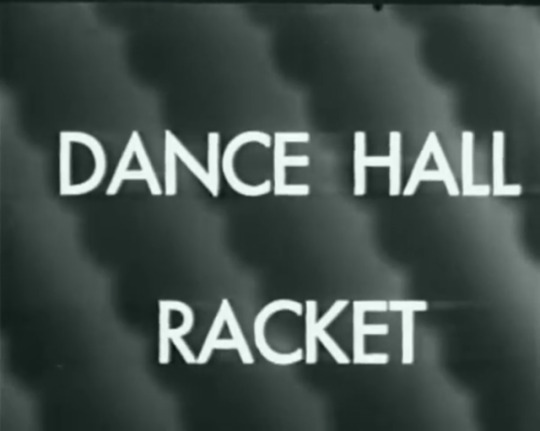
Dance Hall Racket
Remember Timothy Farrell as gangster Umberto Scalli from Racket Girls? He's back with a new scheme in Dance Hall Racket!
What's that? You want to know how he could be back in 1954's Dance Hall Racket when he was shot and killed in 1951's Racket Girls? So do I. My first theory was that Dance Hall Racket was actually a prequel to Racket Girls rather than a sequel, but he dies at the end of this one, too. Farrell also played Scalli in a third movie, 1949's The Devil's Sleep (which I guess is actually the first Scalli movie, being as it was made before the other two). I haven't seen that one, but I'll look for it, and if he doesn't die at the end I will be extremely disappointed.
Scalli's scheme this time is using a nightclub as a front to launder the money he makes by smuggling diamonds inside dogs' ears (this actually happens), but if he wants his longtime girlfriend Fortuna to marry him, he's gonna need more than that. An old friend of Scalli's, Victor Pappas, is about to be released from prison – if Scalli can make Pappas tell where he hid the loot from their last heist, he'll be rich enough to win her over, but little does he know, his criminal empire is about to topple (again). Undercover cop Charlie Edson is investigating him, looking for the murderer of a sailor. You'd think being killed once would be enough to teach Scalli that crime doesn't pay.
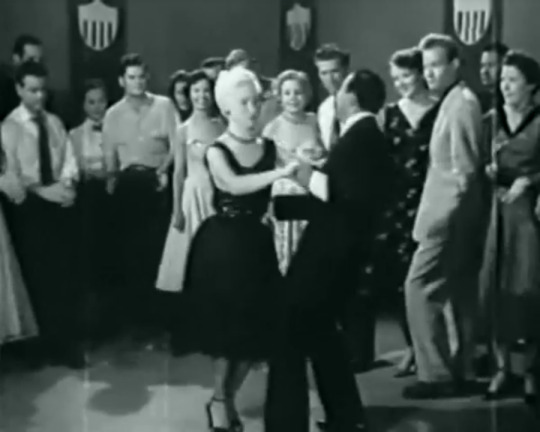
The cops use the phrase 'sea men' to refer to sailors. I'm imagining Tom and Crow snickering over that while Joel tries his best to keep them from making jokes too overt for television.
“But Joel, he said...”
“I know he did, Crow, but there are kids in the audience!”
I went into this movie trying not to remember the pain of watching Racket Girls, but I really expected more of the same. Because of this, the first quarter hour or so of Dance Hall Racket was actually a pleasant surprise. Racket Girls began with a scene of wrestling that really contributed nothing at all – Dance Hall Racket, however, got right on with actually telling its story! The exposition about Scalli, Pappas, and Fortuna wasn’t too annoying, we got to see the sailor killed and Edson sent in undercover, and I began to hope that this might be an actual movie. Sadly, having set up all of that, the story came to a dead screeching halt and began puttering around killing time.
It does this in two main ways: one is watching women change. These scenes are filled with weird cuts in which the characters’ clothes appear and vanish again, while the actresses remain standing in the same spot. They’re often not wearing any less clothing, and the dialogue continues, so we’re not supposed to think that any time has passed. I think the cuts may have less to do with modesty than with a camera that could only film a certain number of seconds in one take. There’s also a scene in which two drunk women have some kind of limp-wristed parody of a catfight which is so bad it’s actually laugh-out-loud funny.
The other way the movie fills time is with Punchy, a supposed ‘comic relief’ character who is so devoid of humour I think I’ve forgotten how to tell a joke.
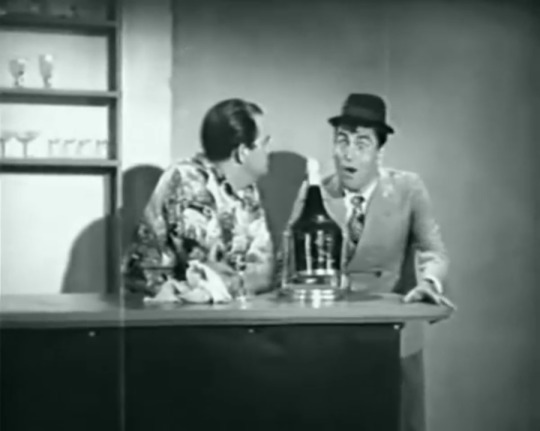
So yeah, all this goes on for another half an hour, during which time very little happens that’s actually relevant to the plot. Occasionally hints of it peek out of the foliage, but mostly we’re listening to Punchy fail to be funny, or watching Scalli’s goons threaten women with knives when he thinks they’re stealing from him (like Jackie and her Swanky Apartment in Racket Girls, I guess). Then when we’ve almost forgotten about him, Pappas finally shows up and the movie actually takes a surprising turn, when jealous and trigger-happy thug Vinnie takes exception to Scalli appointing his girlfriend Rose as Pappas’ date for the evening.
This is a surprisingly good piece of storytelling for this movie – Vinnie’s possessiveness of Rose was set up earlier, although by this point we’ve pretty much forgotten about that, too. So much time was spent on other details of the characters’ lives and relationships that turned out to be irrelevant, we can’t be blamed for assuming Vinnie and Rose are more of the same. Seeing it paid off like that was actually kind of satisfying. Unfortunately, it also serves to emphasize just how many other things were set up in the movie that didn’t pay off, many of which seemed like they ought to be important.
What, for example, happened to Fortuna? We only saw her in one scene and then she vanished utterly. She was the one Scalli was trying to please, so you’d think we’d see her hanging around and pestering him. What happened to Icepick, the guy who wanted to leave the racket and get married? His story was set up in a way that makes us sure something terrible is going to happen to him, but the movie never gets around to it. What’s up with Pappas being unable to speak? We’re told twice that he had his tongue cut out and that really sounds like it ought to be a plot point but it never is. When he made sure Vinnie got shot I thought for a moment it would turn out that he’d agreed to work for the cops in order to get out of jail, but the movie ends without going into it.
It’s also another movie that can’t really be said to have a hero. We don’t know Edson at all – we don’t even learn his name until well after he’s introduced and nothing he does ever gives him a personality. He’s just A Cop. The movie is much more interested in the various double-crossings among the nasty types who work for Scalli. None of these people can really be considered a protagonist, since they’re all horrible and never sympathetic in the least, but they at least have relationships and motivations.
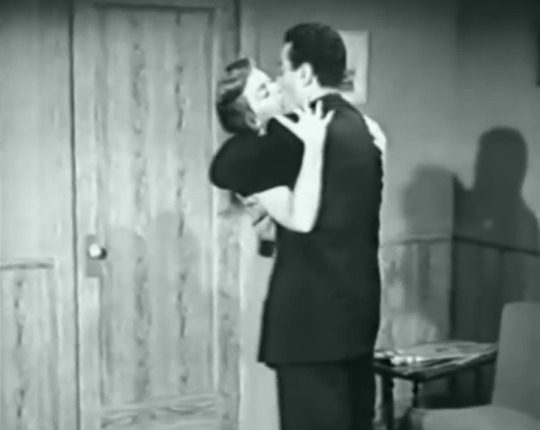
For all that, though, this is still a better movie than Racket Girls! The irrelevant dancing is somehow much more bearable than irrelevant wrestling was, maybe because the dancing isn’t a contest and we don’t feel we’re supposed to have something invested in it when we can’t. More importantly, we don’t have a Peaches Page in this movie. There are plenty of half-clothed women in it, and the movie leers at them unapologetically, but there’s no single one who is set up as a potential hero only to be exploited and forgotten about. In this sense, Dance Hall Racket feels a little more honest and a little less disappointing. It’s a terrible, terrible movie, but it’s not quite as bad as I know it could have been.
Between this and Racket Girls, I also think I’m starting to get an inkling of what, if indeed anything, the ‘Scalli Trilogy’ is trying to say. The films are obviously about how crime doesn’t pay, but the comeuppances in them are not brought about by the police but by Scalli’s fellow criminals. Crime doesn’t pay, but organized crime in particular cannot possibly pay because everybody in the organization is a criminal, and criminals are by nature untrustworthy and therefore unable to work together. Maybe this is what’s being emphasized by Lois the thief in this movie, or Jackie and her Swanky Apartment in Racket Girls – there can be no cooperation when everybody is out for themselves.
I also have to wonder what’s going on with the thing where Scalli dies in Movie One only to reappear in Movie Two a few years later and die again. The two can’t possibly be in continuity with each other unless Scalli respawns like a video game character every time he’s killed, so what gives? Is Dance Hall Racket supposed to be a remake? That kind of makes sense when you consider how it does try to start correcting some of its predecessor’s mistakes. Is this an alternate universe, demonstrating that crime doesn’t pay in any possible world? Has Scalli been reincarnated, only to learn nothing from the mistakes of his previous lifetime? This fascinates me far more than it should.
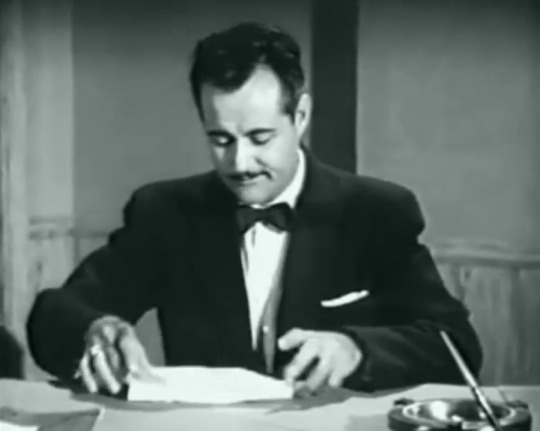
You may wonder why I bother to think about it when the real answer is obviously just that the film-makers and actor Timothy Farrell were just too damned lazy to come up with a new character. It’s true that there’s probably no more to it than that, and yet I’m not totally sure, because the movie does make a point of ending where it began. With Scalli and Vinnie both dead and Icepick out of the racket, management of the club falls to the next guy down on the totem pole, bouncer Bert. We’ve heard the girls who work there talk about him and how he keeps everybody in line – both the customers and the girls themselves. The policeman who has supposedly been narrating the whole story says they figure Bert is continuing to launder money and sooner or later he’ll be next on their list, and thus the whole cycle starts again.
I gotta see that third (first) Scalli movie. Maybe that one will tell me whether there’s really anything going on there. Or maybe, considering how much of an improvement this one was over Racket Girls, it’ll just be totally unwatchable. The only thing I can be absolutely certain of is that Dance Hall Racket would have made for some awesome MST3K.
17 notes
·
View notes
Photo

320: The Unearthly
The first word that comes to mind to describe this movie is 'colourless', which gets an immediate reaction of well, duh, because the movie is of course in black and white. But above and beyond that, The Unearthly is completely lacking in interest, tension, characters, and everything ese that makes a movie entertaining. It could have had these things, but apparently it just didn't bother.
Mad Scientist Dr. Charles Conway believes he has discovered the secret to immortality – an artificial gland which, when implanted into the patient's brain, will modulate their hormones to keep them young and fit forever! So far all his test subjects end up deformed, dead, or unresponsive, but he's determined that he'll get it right if he just keeps trying, and has a friend refer mental patients to him so he can continue to experiment on them. Then fate throws a wrench in the works, in the form of escaped criminal Mark Houston. Conway takes Houston in with the idea of blackmailing him, but Houston is actually an undercover police officer, here to expose the whole project.
The Unearthly is a difficult movie to write a summary of, actually, because the story is very unfocused and seems to spend a lot of time wandering aimlessly from scene to scene without actually getting anything done. This is largely because of the way it handles its characters. Mark Houston is technically our hero, but we don't meet him until we've already spent almost ten minutes getting to know a completely different character in a way that suggests she will be our protagonist.
The movie begins with Grace Thomas, a woman suffering from mental illness, whose psychologist Dr. Wright has brought her to Conway's quiet little halfway house. Supposedly this is for treatment, but once Grace is out of the room the two doctors' conversation makes it clear that they intend to fake her death and experiment on her. All this is dealt with in some detail, and in a way that seems to set Grace up as the audience identification character. Somebody who watched only these first few minutes would probably guess that the rest of the movie is about Grace discovering that something is wrong and trying to get in touch with her father, whom Wright identifies as her only living family.
This is not the case, though. Grace goes to bed, Wright heads out to throw her purse in the bay and claim she drowned herself, and then we meet Mark. For the rest of the film, it will be Mark we follow, as he investigates Conway's nefarious experiments while Grace sits around doing and saying nothing much of interest. In fact, Grace is a singularly bland character, partly because she's written that way and partly because the actress evinces no interest in her lines whatsoever. Allison Hayes was in two other MST3K features, The Undead and Gunslinger, as well as a number of other classic b-movies like Attack of the 50-Foot Woman and Zombies of Mora Tau, and this is the worst performance I have ever seen her give. She sounds like she's bored to tears.
In fact, Grace has less personality than any other member of the cast, including Tor Johnson's Lobo. The other patients at Conway's retreat include Dan, a man prone to fits of anger, and Natalie, a chipper and trusting young woman looking forward to going home. Conway himself is egotistical and obsessive, and his assistant, Dr. Gilchrist, is professional and a little bit motherly. Mark is nosy but cautious, as befits his investigative role. I cannot pick out any personality traits like this for Grace. She just says lines while staring blankly at the wall.
While Mark may be the hero, we are clearly supposed to feel something for Grace. The last two people Dr. Conway experimented on came to bad ends, and we're supposed to worry that Grace will be next and Mark will not be in time to save her. She is such a nonentity, though, that it's almost impossible to care. We're supposed to want to see a romance blossom between her and Mark, but she's totally apathetic. We're supposed to believe that she trusts Dr. Conway and comes to him with her problems, but the movie tells us this without bothering to establish it properly. Even when she's supposed to be angry with Mark and ordering him to leave her alone, it just doesn't work. Nothing around Grace is interesting, and since she is the focal point for other characters throughout the narrative, the movie never has a proper center. That, however, is merely annoying. If you want to get angry at this movie, let's talk about portrayals of women and mental illness.
Dr. Conway's patients are explicitly mental patients, perhaps because he claims to need perfect physical specimens for his artificial gland to work. Mental illness in movies is usually not researched very well, and I don't think The Unearthly was an exception to that, even though it tries to be a little more realistic. At least it doesn't have anybody who talks to hand puppets or a guy who thinks he's Napoleon – what it's got is Dan, a man who is a bit paranoid and suffers from fits of ranting anger, sometimes needing medication to calm down. He is presented as something of a joke, and the other characters treat him as if they consider him unreasonable rather than ill – but he is at least allowed to be ill and show symptoms. The same cannot be said of the women.
Grace is described as having suffered a nervous breakdown and being prone to mood swings: she'll be suddenly afraid, or will break down in tears for no reason, but we never see her behave oddly. In fact, Grace comes across as calm and collected at all times, and we see no difference in her between the scene where she arrives and the one where Dr. Conway tells her she's made excellent progress. Natalie is presented to us as nearly cured and ready to leave the retreat, so it's not surprising if she shows no symptoms, but she is unable to describe her previous illness as anything other than an inability to 'get herself together'.
So what we have here is two cases of acute Fictional Disease: women in movies are allowed to suffer from terrible illnesses, but only as long as these do not render them unattractive or antisocial. A woman going into the same kind of rant as Dan would come across as bitchy rather than ill, and would be automatically unsympathetic to a male audience who would associate such behaviour with the stereotype of the nitpicking, nagging wife. We're supposed to like Grace and Natalie, so their health problems can only manifest in ways that make us want to protect and help them, and actual symptoms are kept discreetly off-camera. At the end of the story, I think we're supposed to assume that Grace's problems will be solved not by a licensed practitioner with years of training, but by the power of Twu Wuv. Evidently people in the 50's still accepted the Victorian idea that all women's health issues can be solved by a generous application of dick.
Then there's the way Dr. Conway behaves towards Grace. At their first appointment, he tells this sick woman who has been committed to his care that she looks lovely, and that “if I were Rembrandt I would paint a portrait of you”. He claims that many women would envy her and that her looks and charm make her worthy of attention and protection. Perhaps if Grace is suffering from low self-esteem these are things she needs to hear, but they come across as deeply creepy and unprofessional, and the worst part is that I can't actually tell if the movie wants us to find them so.
There was a similar dynamic, with a mad scientist hitting on his patient while the female assistant became jealous, in Atom Age Vampire, but in that movie it was explicitly manipulative and wrong. The Unearthly, however, is much more neutral in its presentation of this material. It just sits back and watches, without placing a value judgment, and Dr. Gilchrist's condemnation of the behaviour is much milder than that of her counterpart in Atom Age Vampire. Later Dr. Conway laments the fact that Grace has 'turned on him', suggesting that he did in fact have feelings for her... in which case, perhaps we're meant to think he was expressing honest affection? Whatever the case, it's gross.
The Unearthly's single greatest moment of misogyny, however, comes courtesy of Dr. Wright. In order to facilitate Grace's disappearance, Dr. Wright throws some of her possessions into the sea in order to suggest she committed suicide in her depression. Not long after, he finds himself in a similar pickle when another vanished patient's sister turns up on his doorstep – Wright calls Conway to ask what to do, and Conway tells him to simply make out a death certificate for the man, who has been in a coma since the experiment anyway. Wright, who personally came up with the plan to fake Grace's suicide, is horrified.
There are only two possibilities I can come up with to explain this contradiction. Either the screenwriter just couldn't keep track of which characters were willing to do what in the name of science – or Dr. Wright is just fine with faking the death of a woman, whose life doesn't matter, but repulsed by the thought of doing it for a man, whose does. I think it's just shitty writing, but I can't be sure.
The Unearthly really could have been much better than it is, but it did just about everything wrong. The idea of a mad scientist experimenting on mental patients because he knows anything they say will not be believed is one that could work, but is never explored. Conway's basement full of possibly-immortal monsters could have been used to much better effect. Mark's assumed persona of criminal on the run wondering what he's gotten into was far more interesting than his actual role turned out to be. Grace would have been a way better character if she'd ever done something. Anything. In the end, the movie simply misses every opportunity it had, and the result is as dull as a bowl of plain oatmeal. Like I said, colourless.
17 notes
·
View notes
Photo

Neuroethology of Toads
All right, I've been feasting on low-hanging b-movie fruit for too long – let's try a short. This particular short was not intended for public consumption. It's meant to be informative, but not what you'd call entertaining... despite which, it's often very entertaining. It's also divided into discreet sections, meaning the Brains could have picked and chosen their material to make it fit in whatever time they had left over from the movie. I can't really compare it to anything that ever aired on MST3K, but I was riffing it in my head the entire time I watched it and I highly recommend heading on over to YouTube and taking a look for yourself. If I’ll never unsee this shit, I’m gonna drag you guys to hell with me!
'Neuroethology' is the study of what goes on in an animal's brain – but unfortunately for all of us who want to know what the hell our cats are thinking, it's got nothing to do with reading the animal's mind as Markov the Magnificent does with Alex the Chimp. Rather, it's an attempt to understand the relationship between stimulus and behaviour. In Neuroethology of Toads, the behaviour in question is snapping at prey, and the scientists want to know exactly how the toad comes to the decision that something is edible, hoping to learn how to program better object recognition software for robots. They devise a series of experiments that first establish what stimulus is necessary, and then probe deep into the inner workings of the toad's brain.
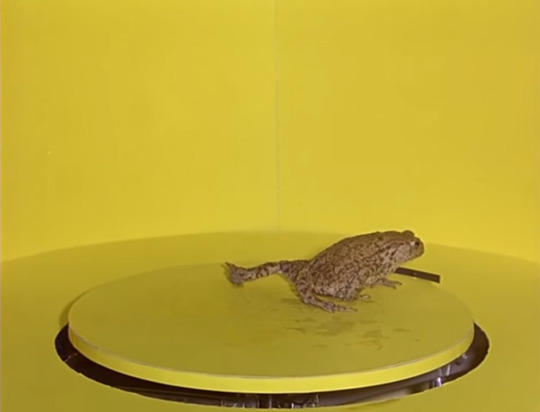
This sounds so simple and dry when I just describe it. In practice, it is bizarre. The first experiment sees the toad placed on a platform while a machine moves a piece of black cardboard in a circle around it. This experimental setup is called an 'arena', which makes one think of some kind of toad gladiatorial combat. If the cardboard is moved horizontally, the toad tries to eat it. If it is moved vertically, the toad ignores it. The scientists decide to refer to this as 'worm' and 'anti-worm' motion. They investigate further, placing the toad in a box to watch lines move worm-wise and anti-worm-wise across a screen. The toad strikes repeatedly. Food is always out of reach, yet it cannot help itself. Its brain is not complex enough to catch on to the trick, leaving the hapless amphibian a slave to its reflexes.

It's difficult to watch this and not come up with riffs. I imagine Crow narrating the toad's frustrated internal monologue while Tom Servo makes observations like, “you mean all this time, all worms had to do was learn to stand on their heads?” In the break between the short and the movie, the bots attempt to ply Mike with hot dogs moved in weenie and anti-weenie motion across the hexfield. Does mustard trigger his feeding reflex? Does sauerkraut? Pearl watches, trying to steal their results. Bobo interrupts, trying to steal the hot dogs. He thinks they’re bananas. Everything looks like a banana to Bobo.
Having established a stimulus, the narrator goes on to talk about toad brains, and how the scientists implanted electrodes in them to keep an eye on the electrical activity within. One of these enhanced cyber-toads is strapped to a platform to watch lines performing worm motion, and its toady little thoughts appear on an oscilloscope. The machinery involved really looks like it ought to be disintegrating toads with sound waves or something. Watching it rotate silently into position while the paralyzed toad sits there with a wire in its head is deeply ominous. The lack of background music somehow makes it worse.

Here we learn that while toads have some neurons that specifically recognize worms, there are others that specifically recognize things that are not worms. The worm cells and the not-worm cells have to agree that something is definitely a worm before the toad will bite it. The narrator continues to say stuff like “the same stripe in anti-worm configuration goes practically unresponded.” There are diagrams with the text in German, which don’t make things any less sinister or amusing.
The most horrible moment of all, however, is when the narrator starts talking about how the image of a large moving square activates neurons involved in running away. We don't get to see this particular experiment, but we can imagine it in detail: the toad, squashed on a table with wires in its brain as this giant shadowy shape looms over it, wanting to flee but unable to move, while lab-coated humans peer into its mind with machines. Holy shit. Maybe that's what those abducting aliens are doing! Maybe somewhere out there in the space internet is a video called Neuroethology of Humans, discussing how our brains recognize things that are and are not ice cream!
Then we learn about how the scientists rendered the toad brains radioactive before dissecting them.
I'm not even kidding. They offer a reason for it, but the viewer is forced to confront the fact that these German scientists created radioactive toad brains. What kind of science is that? I'll tell you – it's mad science, that's what it is! Anybody whose work includes torture, brains, and radioactivity is either a supervillain or... there's no second option there. That's a supervillain. It probably all ties in to their plan to kill Captain America.

Finally, the scientists must test their hypothesis about toad decision-making. To this end they sever some of the neural connections, figuring if they've got this right, then the stimulus that previously made the toad want to run will now make it respond as if to a worm. And you know what? They're right! This poor toad is confronted with something that ought to terrify it, and instead it tries to bite it. Imagine this toad escaping into the wild. A shape appears beside it. It strikes, expecting food, only to be plucked from the ground by a pelican. It dies never understanding, believing to the last that it ought to be eating a tasty worm right now.
The film isn't meant to do anything but present the results of a scientific investigation. The narrator's tone is detached throughout, and there's never any music or any attempt at humour. There isn't even a title screen. Only the brief opening sequence shows a toad outside a laboratory setting. The whole thing is as un-cinematic as possible, yet it is often more engaging than some movies I've seen. I certainly felt more involved in this than I did in The Starfighters. Why the hell is that?
I think the answer lies in a property not of the toad brain, but of the human one: we want to find patterns. When presented with a set of information, we will attempt to see a pattern in it, and if we can't we will sometimes imagine one, as we do when we see shapes in the clouds or faces on Mars. What seems to be going on in Neuroethology of Toads is a sort of narrative pareidolia. We're being shown a film, so the 'pattern' to look for ought be a story. There isn't one, so we make one up.
If Neuroethology of Toads had a story, it ought to be a story about the scientists learning how toad brains work. The problem with this is that we never actually see them. There are a few shots of young people, whom I imagine are grad students, working with the equipment, but these are very brief and do not focus on the individuals' faces, so we get no real impression of them. What we do see is the toad reacting to a series of situations – so by default, the toad becomes our protagonist. It is the toad we sympathize with, and it is the toad's internal monologue that we are tempted, as I noted above, to imagine.
This means the 'story' is a horror story. We first see the toad in a fairly normal toad environment, eating real food. Then it is trapped, teased, tortured, and finally murdered so that its radioactive brain can be dissected. Just to rub it in, we're told that these toads are hand-fed. They trusted those experimenters, and they were fucking betrayed. The fact that the experiments going on are the kind of stuff animal rights people have aneurysms over just reinforces the idea that the toad is a doomed victim, and then, of course, there are the repeated subtle reminders that the toad has no idea what is going on. At least Mike, Joel, and Jonah know they're at the mercy of a mad scientist! The toads can't even understand that!

Worse, it's possible to imagine the same things happening to you. We humans like to think that we're more than the sum of our parts, that our minds are somehow above and beyond our bodies, but that's just not true. Google 'brain injuries' and you'll find stories about people who suddenly began believing that their loved ones had been replaced by impostors, or who lost the ability to read. Even if you believe in the soul, the brain is the computer we use to interpret our world, and when something goes wrong with it the results are truly fucked-up.
The cherry on this horror sundae is only added retrospectively. If you watch the short a second time, you will have to revisit the first five minutes, which are the relatively harmless experiment in which the toad is following a piece of cardboard around in a circle. This part is really quite funny, especially when the term 'anti-worm motion' is introduced. Then you descend into madness, as the experiments get more and more horrible and you realize that the first bit wasn't so innocuous as you thought. It's only the first step on a slippery slope that eventually drops you straight into toad hell.
14 notes
·
View notes